Combating International Corporate Bribery
VerifiedAdded on 2020/03/04
|25
|8077
|39
AI Summary
This assignment delves into the global fight against corporate bribery. It explores international conventions like the OECD Anti-Bribery Convention and the UN Convention Against Corruption, examining their provisions and effectiveness in curbing corrupt practices. The analysis also considers legal frameworks within specific jurisdictions such as the UK and Germany, highlighting variations in approach and enforcement mechanisms. Furthermore, it discusses the complexities of regulating multinational corporations and managing third-party risks in combating bribery.
Contribute Materials
Your contribution can guide someone’s learning journey. Share your
documents today.
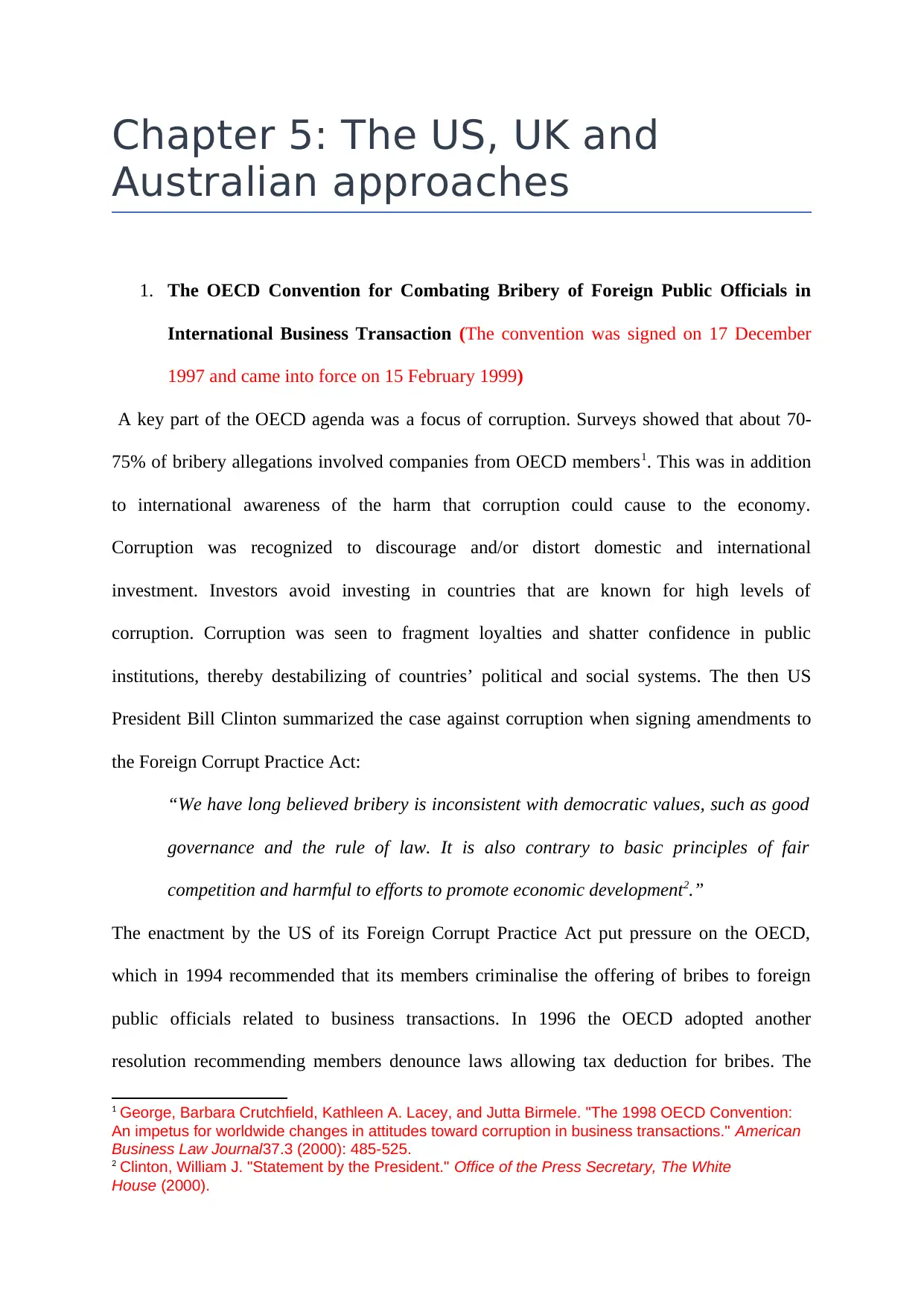
Chapter 5: The US, UK and
Australian approaches
1. The OECD Convention for Combating Bribery of Foreign Public Officials in
International Business Transaction (The convention was signed on 17 December
1997 and came into force on 15 February 1999)
A key part of the OECD agenda was a focus of corruption. Surveys showed that about 70-
75% of bribery allegations involved companies from OECD members1. This was in addition
to international awareness of the harm that corruption could cause to the economy.
Corruption was recognized to discourage and/or distort domestic and international
investment. Investors avoid investing in countries that are known for high levels of
corruption. Corruption was seen to fragment loyalties and shatter confidence in public
institutions, thereby destabilizing of countries’ political and social systems. The then US
President Bill Clinton summarized the case against corruption when signing amendments to
the Foreign Corrupt Practice Act:
“We have long believed bribery is inconsistent with democratic values, such as good
governance and the rule of law. It is also contrary to basic principles of fair
competition and harmful to efforts to promote economic development2.”
The enactment by the US of its Foreign Corrupt Practice Act put pressure on the OECD,
which in 1994 recommended that its members criminalise the offering of bribes to foreign
public officials related to business transactions. In 1996 the OECD adopted another
resolution recommending members denounce laws allowing tax deduction for bribes. The
1 George, Barbara Crutchfield, Kathleen A. Lacey, and Jutta Birmele. "The 1998 OECD Convention:
An impetus for worldwide changes in attitudes toward corruption in business transactions." American
Business Law Journal37.3 (2000): 485-525.
2 Clinton, William J. "Statement by the President." Office of the Press Secretary, The White
House (2000).
Australian approaches
1. The OECD Convention for Combating Bribery of Foreign Public Officials in
International Business Transaction (The convention was signed on 17 December
1997 and came into force on 15 February 1999)
A key part of the OECD agenda was a focus of corruption. Surveys showed that about 70-
75% of bribery allegations involved companies from OECD members1. This was in addition
to international awareness of the harm that corruption could cause to the economy.
Corruption was recognized to discourage and/or distort domestic and international
investment. Investors avoid investing in countries that are known for high levels of
corruption. Corruption was seen to fragment loyalties and shatter confidence in public
institutions, thereby destabilizing of countries’ political and social systems. The then US
President Bill Clinton summarized the case against corruption when signing amendments to
the Foreign Corrupt Practice Act:
“We have long believed bribery is inconsistent with democratic values, such as good
governance and the rule of law. It is also contrary to basic principles of fair
competition and harmful to efforts to promote economic development2.”
The enactment by the US of its Foreign Corrupt Practice Act put pressure on the OECD,
which in 1994 recommended that its members criminalise the offering of bribes to foreign
public officials related to business transactions. In 1996 the OECD adopted another
resolution recommending members denounce laws allowing tax deduction for bribes. The
1 George, Barbara Crutchfield, Kathleen A. Lacey, and Jutta Birmele. "The 1998 OECD Convention:
An impetus for worldwide changes in attitudes toward corruption in business transactions." American
Business Law Journal37.3 (2000): 485-525.
2 Clinton, William J. "Statement by the President." Office of the Press Secretary, The White
House (2000).
Secure Best Marks with AI Grader
Need help grading? Try our AI Grader for instant feedback on your assignments.
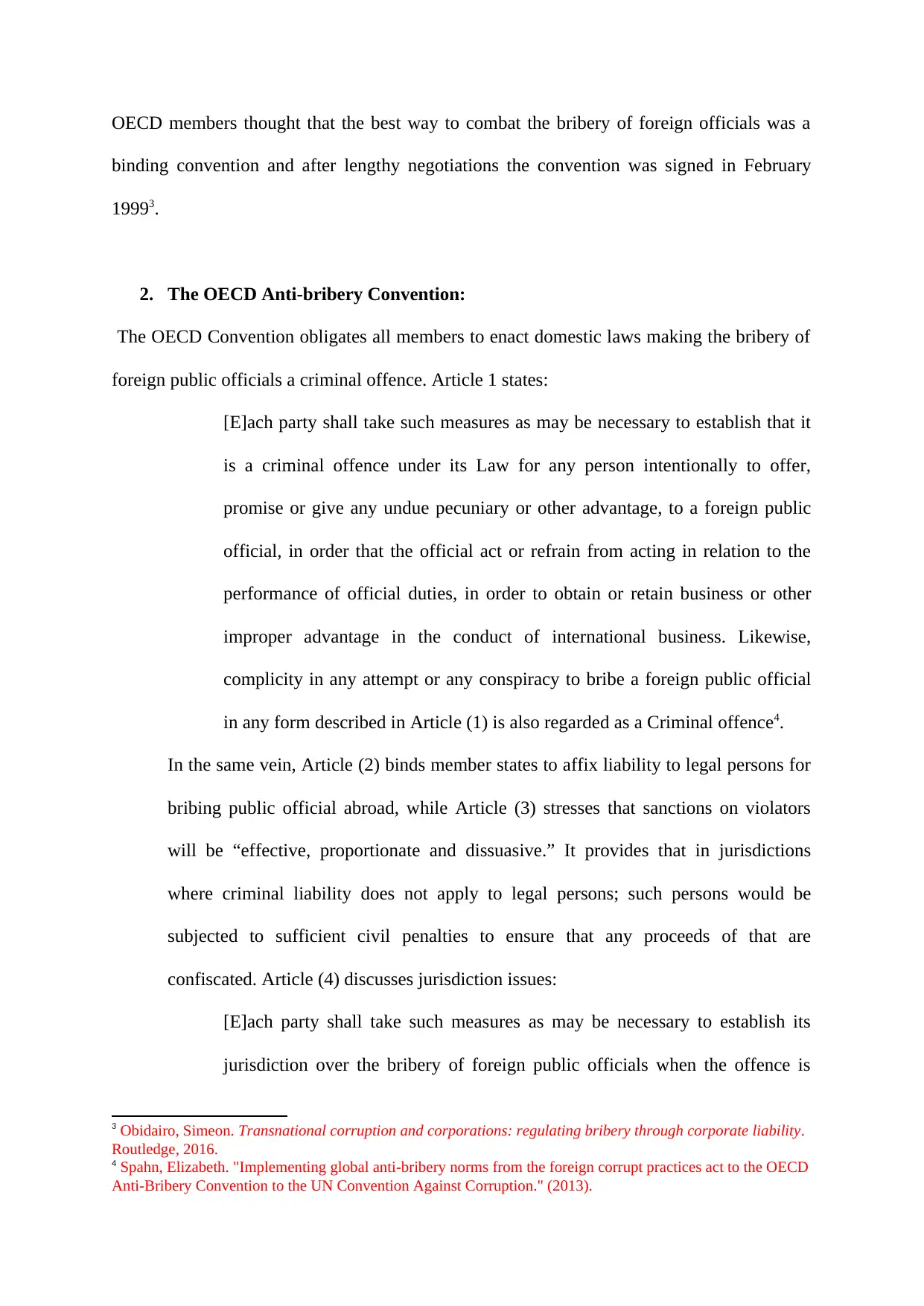
OECD members thought that the best way to combat the bribery of foreign officials was a
binding convention and after lengthy negotiations the convention was signed in February
19993.
2. The OECD Anti-bribery Convention:
The OECD Convention obligates all members to enact domestic laws making the bribery of
foreign public officials a criminal offence. Article 1 states:
[E]ach party shall take such measures as may be necessary to establish that it
is a criminal offence under its Law for any person intentionally to offer,
promise or give any undue pecuniary or other advantage, to a foreign public
official, in order that the official act or refrain from acting in relation to the
performance of official duties, in order to obtain or retain business or other
improper advantage in the conduct of international business. Likewise,
complicity in any attempt or any conspiracy to bribe a foreign public official
in any form described in Article (1) is also regarded as a Criminal offence4.
In the same vein, Article (2) binds member states to affix liability to legal persons for
bribing public official abroad, while Article (3) stresses that sanctions on violators
will be “effective, proportionate and dissuasive.” It provides that in jurisdictions
where criminal liability does not apply to legal persons; such persons would be
subjected to sufficient civil penalties to ensure that any proceeds of that are
confiscated. Article (4) discusses jurisdiction issues:
[E]ach party shall take such measures as may be necessary to establish its
jurisdiction over the bribery of foreign public officials when the offence is
3 Obidairo, Simeon. Transnational corruption and corporations: regulating bribery through corporate liability.
Routledge, 2016.
4 Spahn, Elizabeth. "Implementing global anti-bribery norms from the foreign corrupt practices act to the OECD
Anti-Bribery Convention to the UN Convention Against Corruption." (2013).
binding convention and after lengthy negotiations the convention was signed in February
19993.
2. The OECD Anti-bribery Convention:
The OECD Convention obligates all members to enact domestic laws making the bribery of
foreign public officials a criminal offence. Article 1 states:
[E]ach party shall take such measures as may be necessary to establish that it
is a criminal offence under its Law for any person intentionally to offer,
promise or give any undue pecuniary or other advantage, to a foreign public
official, in order that the official act or refrain from acting in relation to the
performance of official duties, in order to obtain or retain business or other
improper advantage in the conduct of international business. Likewise,
complicity in any attempt or any conspiracy to bribe a foreign public official
in any form described in Article (1) is also regarded as a Criminal offence4.
In the same vein, Article (2) binds member states to affix liability to legal persons for
bribing public official abroad, while Article (3) stresses that sanctions on violators
will be “effective, proportionate and dissuasive.” It provides that in jurisdictions
where criminal liability does not apply to legal persons; such persons would be
subjected to sufficient civil penalties to ensure that any proceeds of that are
confiscated. Article (4) discusses jurisdiction issues:
[E]ach party shall take such measures as may be necessary to establish its
jurisdiction over the bribery of foreign public officials when the offence is
3 Obidairo, Simeon. Transnational corruption and corporations: regulating bribery through corporate liability.
Routledge, 2016.
4 Spahn, Elizabeth. "Implementing global anti-bribery norms from the foreign corrupt practices act to the OECD
Anti-Bribery Convention to the UN Convention Against Corruption." (2013).
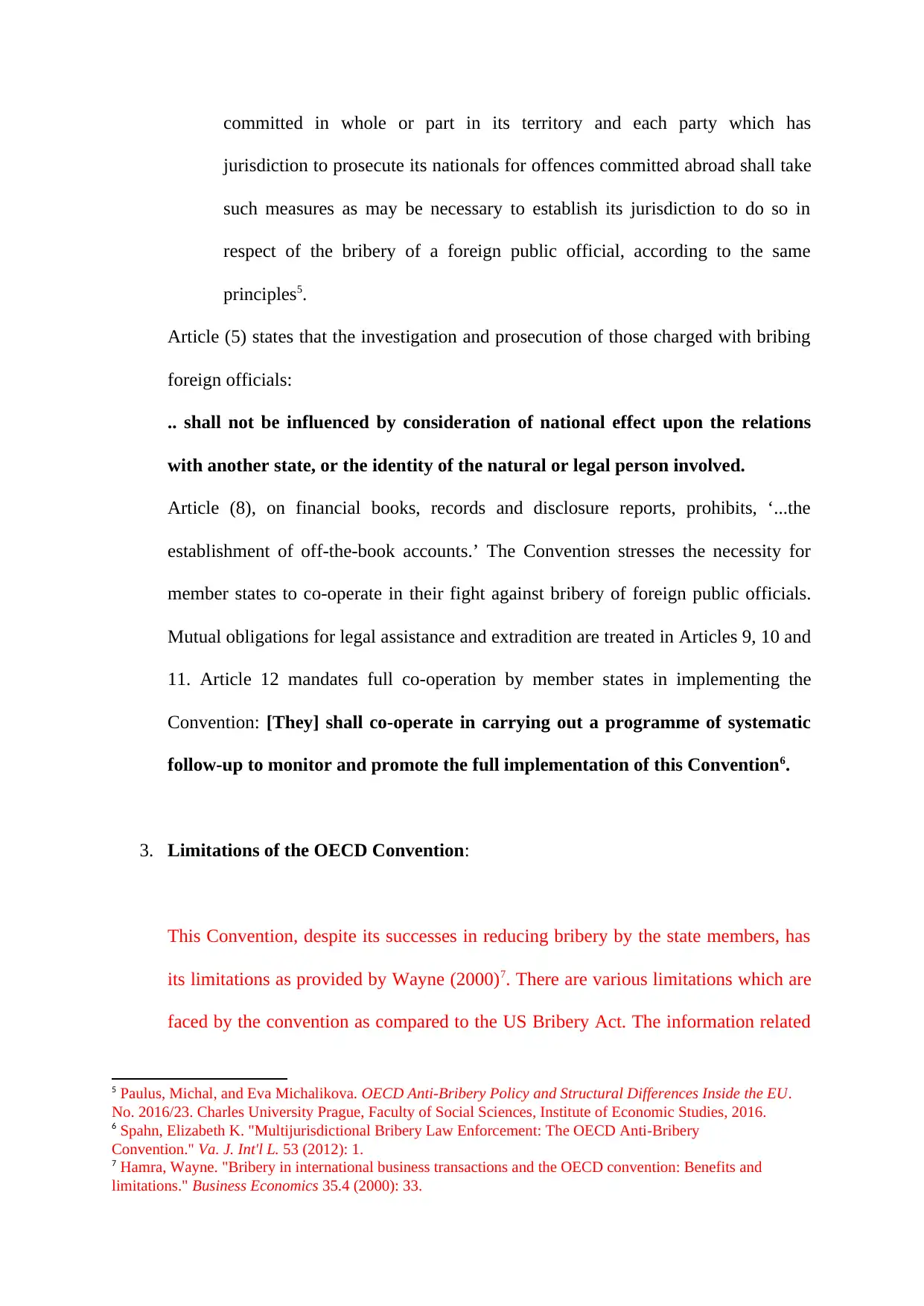
committed in whole or part in its territory and each party which has
jurisdiction to prosecute its nationals for offences committed abroad shall take
such measures as may be necessary to establish its jurisdiction to do so in
respect of the bribery of a foreign public official, according to the same
principles5.
Article (5) states that the investigation and prosecution of those charged with bribing
foreign officials:
.. shall not be influenced by consideration of national effect upon the relations
with another state, or the identity of the natural or legal person involved.
Article (8), on financial books, records and disclosure reports, prohibits, ‘...the
establishment of off-the-book accounts.’ The Convention stresses the necessity for
member states to co-operate in their fight against bribery of foreign public officials.
Mutual obligations for legal assistance and extradition are treated in Articles 9, 10 and
11. Article 12 mandates full co-operation by member states in implementing the
Convention: [They] shall co-operate in carrying out a programme of systematic
follow-up to monitor and promote the full implementation of this Convention6.
3. Limitations of the OECD Convention:
This Convention, despite its successes in reducing bribery by the state members, has
its limitations as provided by Wayne (2000)7. There are various limitations which are
faced by the convention as compared to the US Bribery Act. The information related
5 Paulus, Michal, and Eva Michalikova. OECD Anti-Bribery Policy and Structural Differences Inside the EU.
No. 2016/23. Charles University Prague, Faculty of Social Sciences, Institute of Economic Studies, 2016.
6 Spahn, Elizabeth K. "Multijurisdictional Bribery Law Enforcement: The OECD Anti-Bribery
Convention." Va. J. Int'l L. 53 (2012): 1.
7 Hamra, Wayne. "Bribery in international business transactions and the OECD convention: Benefits and
limitations." Business Economics 35.4 (2000): 33.
jurisdiction to prosecute its nationals for offences committed abroad shall take
such measures as may be necessary to establish its jurisdiction to do so in
respect of the bribery of a foreign public official, according to the same
principles5.
Article (5) states that the investigation and prosecution of those charged with bribing
foreign officials:
.. shall not be influenced by consideration of national effect upon the relations
with another state, or the identity of the natural or legal person involved.
Article (8), on financial books, records and disclosure reports, prohibits, ‘...the
establishment of off-the-book accounts.’ The Convention stresses the necessity for
member states to co-operate in their fight against bribery of foreign public officials.
Mutual obligations for legal assistance and extradition are treated in Articles 9, 10 and
11. Article 12 mandates full co-operation by member states in implementing the
Convention: [They] shall co-operate in carrying out a programme of systematic
follow-up to monitor and promote the full implementation of this Convention6.
3. Limitations of the OECD Convention:
This Convention, despite its successes in reducing bribery by the state members, has
its limitations as provided by Wayne (2000)7. There are various limitations which are
faced by the convention as compared to the US Bribery Act. The information related
5 Paulus, Michal, and Eva Michalikova. OECD Anti-Bribery Policy and Structural Differences Inside the EU.
No. 2016/23. Charles University Prague, Faculty of Social Sciences, Institute of Economic Studies, 2016.
6 Spahn, Elizabeth K. "Multijurisdictional Bribery Law Enforcement: The OECD Anti-Bribery
Convention." Va. J. Int'l L. 53 (2012): 1.
7 Hamra, Wayne. "Bribery in international business transactions and the OECD convention: Benefits and
limitations." Business Economics 35.4 (2000): 33.
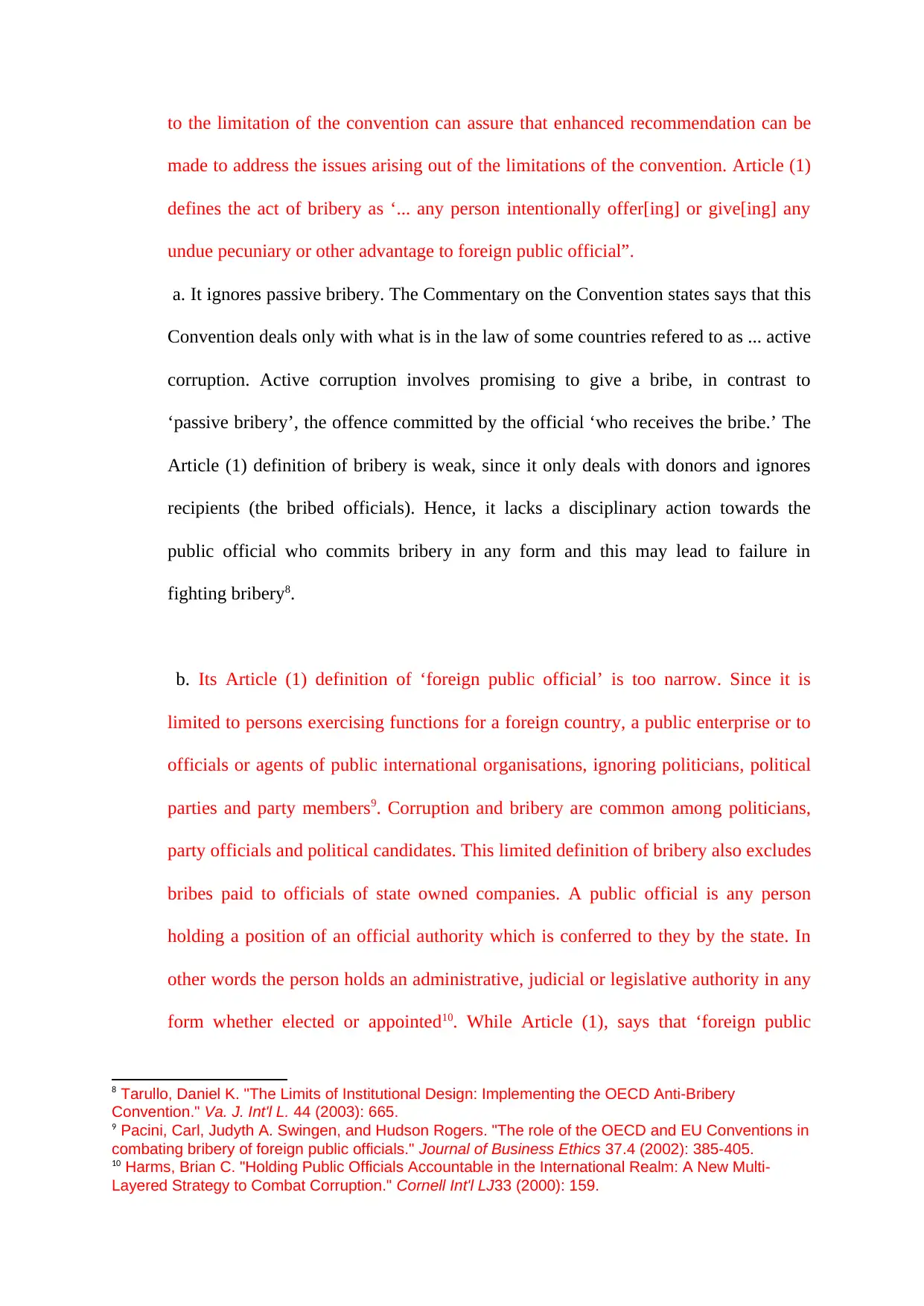
to the limitation of the convention can assure that enhanced recommendation can be
made to address the issues arising out of the limitations of the convention. Article (1)
defines the act of bribery as ‘... any person intentionally offer[ing] or give[ing] any
undue pecuniary or other advantage to foreign public official”.
a. It ignores passive bribery. The Commentary on the Convention states says that this
Convention deals only with what is in the law of some countries refered to as ... active
corruption. Active corruption involves promising to give a bribe, in contrast to
‘passive bribery’, the offence committed by the official ‘who receives the bribe.’ The
Article (1) definition of bribery is weak, since it only deals with donors and ignores
recipients (the bribed officials). Hence, it lacks a disciplinary action towards the
public official who commits bribery in any form and this may lead to failure in
fighting bribery8.
b. Its Article (1) definition of ‘foreign public official’ is too narrow. Since it is
limited to persons exercising functions for a foreign country, a public enterprise or to
officials or agents of public international organisations, ignoring politicians, political
parties and party members9. Corruption and bribery are common among politicians,
party officials and political candidates. This limited definition of bribery also excludes
bribes paid to officials of state owned companies. A public official is any person
holding a position of an official authority which is conferred to they by the state. In
other words the person holds an administrative, judicial or legislative authority in any
form whether elected or appointed10. While Article (1), says that ‘foreign public
8 Tarullo, Daniel K. "The Limits of Institutional Design: Implementing the OECD Anti-Bribery
Convention." Va. J. Int'l L. 44 (2003): 665.
9 Pacini, Carl, Judyth A. Swingen, and Hudson Rogers. "The role of the OECD and EU Conventions in
combating bribery of foreign public officials." Journal of Business Ethics 37.4 (2002): 385-405.
10 Harms, Brian C. "Holding Public Officials Accountable in the International Realm: A New Multi-
Layered Strategy to Combat Corruption." Cornell Int'l LJ33 (2000): 159.
made to address the issues arising out of the limitations of the convention. Article (1)
defines the act of bribery as ‘... any person intentionally offer[ing] or give[ing] any
undue pecuniary or other advantage to foreign public official”.
a. It ignores passive bribery. The Commentary on the Convention states says that this
Convention deals only with what is in the law of some countries refered to as ... active
corruption. Active corruption involves promising to give a bribe, in contrast to
‘passive bribery’, the offence committed by the official ‘who receives the bribe.’ The
Article (1) definition of bribery is weak, since it only deals with donors and ignores
recipients (the bribed officials). Hence, it lacks a disciplinary action towards the
public official who commits bribery in any form and this may lead to failure in
fighting bribery8.
b. Its Article (1) definition of ‘foreign public official’ is too narrow. Since it is
limited to persons exercising functions for a foreign country, a public enterprise or to
officials or agents of public international organisations, ignoring politicians, political
parties and party members9. Corruption and bribery are common among politicians,
party officials and political candidates. This limited definition of bribery also excludes
bribes paid to officials of state owned companies. A public official is any person
holding a position of an official authority which is conferred to they by the state. In
other words the person holds an administrative, judicial or legislative authority in any
form whether elected or appointed10. While Article (1), says that ‘foreign public
8 Tarullo, Daniel K. "The Limits of Institutional Design: Implementing the OECD Anti-Bribery
Convention." Va. J. Int'l L. 44 (2003): 665.
9 Pacini, Carl, Judyth A. Swingen, and Hudson Rogers. "The role of the OECD and EU Conventions in
combating bribery of foreign public officials." Journal of Business Ethics 37.4 (2002): 385-405.
10 Harms, Brian C. "Holding Public Officials Accountable in the International Realm: A New Multi-
Layered Strategy to Combat Corruption." Cornell Int'l LJ33 (2000): 159.
Secure Best Marks with AI Grader
Need help grading? Try our AI Grader for instant feedback on your assignments.
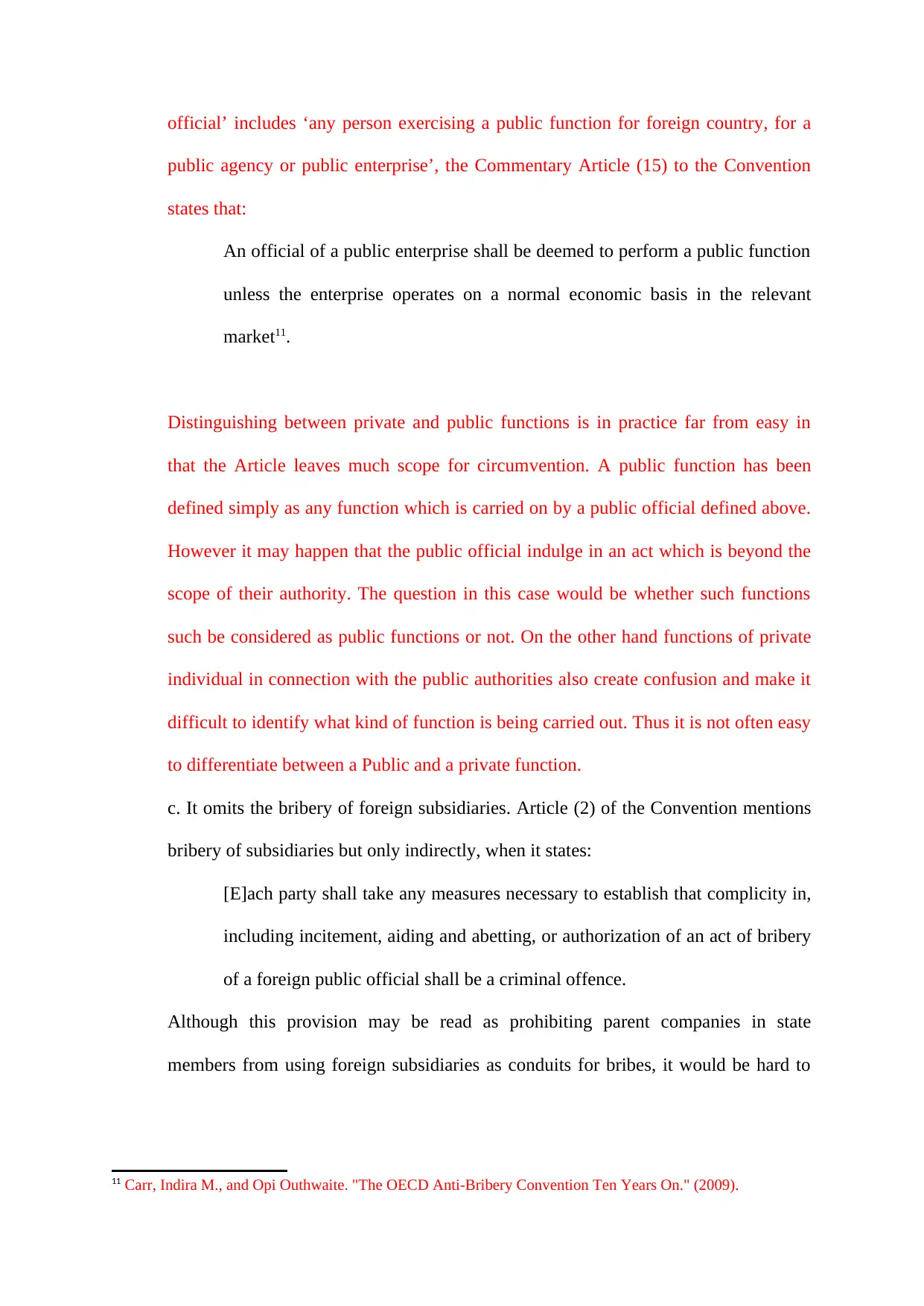
official’ includes ‘any person exercising a public function for foreign country, for a
public agency or public enterprise’, the Commentary Article (15) to the Convention
states that:
An official of a public enterprise shall be deemed to perform a public function
unless the enterprise operates on a normal economic basis in the relevant
market11.
Distinguishing between private and public functions is in practice far from easy in
that the Article leaves much scope for circumvention. A public function has been
defined simply as any function which is carried on by a public official defined above.
However it may happen that the public official indulge in an act which is beyond the
scope of their authority. The question in this case would be whether such functions
such be considered as public functions or not. On the other hand functions of private
individual in connection with the public authorities also create confusion and make it
difficult to identify what kind of function is being carried out. Thus it is not often easy
to differentiate between a Public and a private function.
c. It omits the bribery of foreign subsidiaries. Article (2) of the Convention mentions
bribery of subsidiaries but only indirectly, when it states:
[E]ach party shall take any measures necessary to establish that complicity in,
including incitement, aiding and abetting, or authorization of an act of bribery
of a foreign public official shall be a criminal offence.
Although this provision may be read as prohibiting parent companies in state
members from using foreign subsidiaries as conduits for bribes, it would be hard to
11 Carr, Indira M., and Opi Outhwaite. "The OECD Anti-Bribery Convention Ten Years On." (2009).
public agency or public enterprise’, the Commentary Article (15) to the Convention
states that:
An official of a public enterprise shall be deemed to perform a public function
unless the enterprise operates on a normal economic basis in the relevant
market11.
Distinguishing between private and public functions is in practice far from easy in
that the Article leaves much scope for circumvention. A public function has been
defined simply as any function which is carried on by a public official defined above.
However it may happen that the public official indulge in an act which is beyond the
scope of their authority. The question in this case would be whether such functions
such be considered as public functions or not. On the other hand functions of private
individual in connection with the public authorities also create confusion and make it
difficult to identify what kind of function is being carried out. Thus it is not often easy
to differentiate between a Public and a private function.
c. It omits the bribery of foreign subsidiaries. Article (2) of the Convention mentions
bribery of subsidiaries but only indirectly, when it states:
[E]ach party shall take any measures necessary to establish that complicity in,
including incitement, aiding and abetting, or authorization of an act of bribery
of a foreign public official shall be a criminal offence.
Although this provision may be read as prohibiting parent companies in state
members from using foreign subsidiaries as conduits for bribes, it would be hard to
11 Carr, Indira M., and Opi Outhwaite. "The OECD Anti-Bribery Convention Ten Years On." (2009).
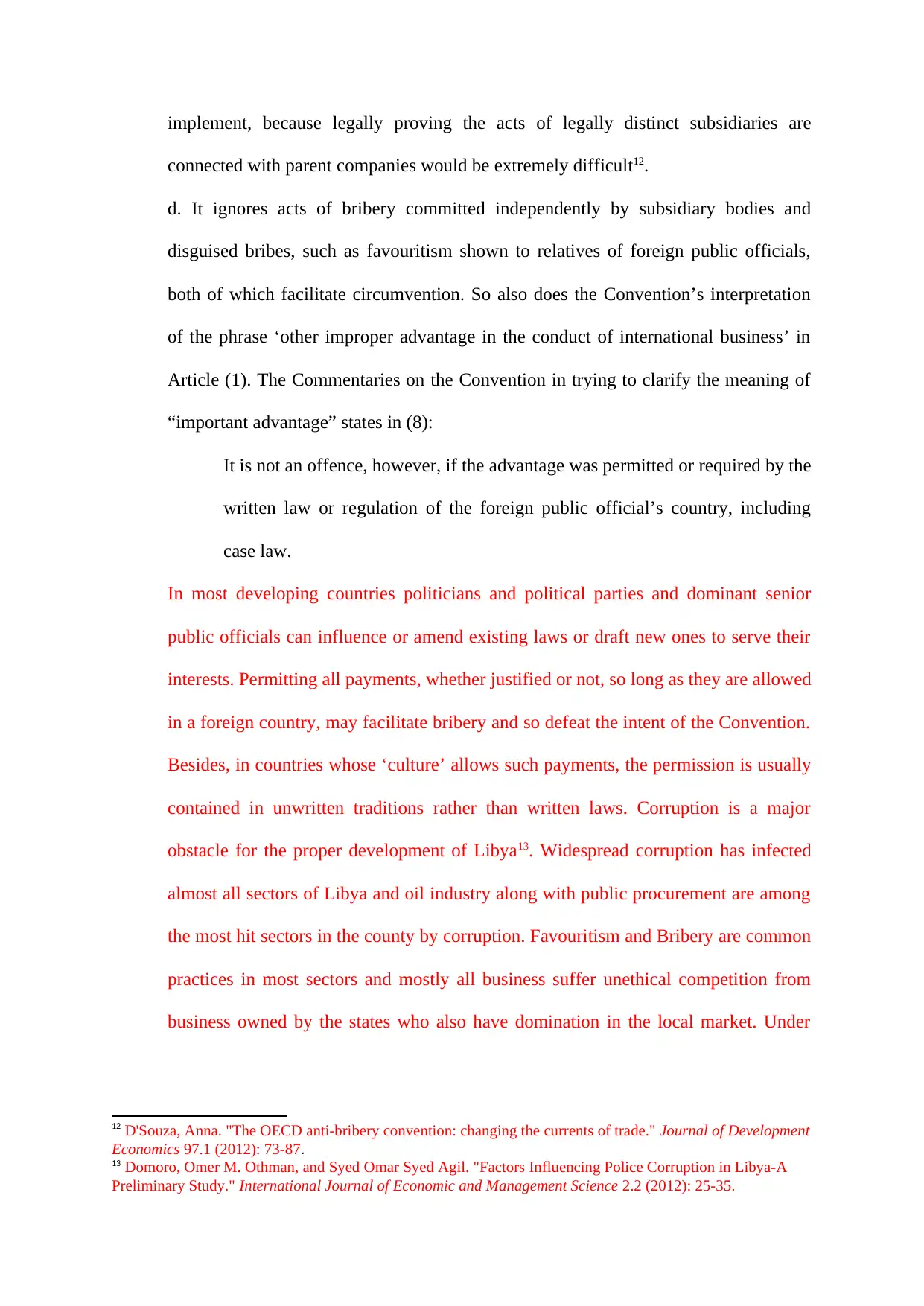
implement, because legally proving the acts of legally distinct subsidiaries are
connected with parent companies would be extremely difficult12.
d. It ignores acts of bribery committed independently by subsidiary bodies and
disguised bribes, such as favouritism shown to relatives of foreign public officials,
both of which facilitate circumvention. So also does the Convention’s interpretation
of the phrase ‘other improper advantage in the conduct of international business’ in
Article (1). The Commentaries on the Convention in trying to clarify the meaning of
“important advantage” states in (8):
It is not an offence, however, if the advantage was permitted or required by the
written law or regulation of the foreign public official’s country, including
case law.
In most developing countries politicians and political parties and dominant senior
public officials can influence or amend existing laws or draft new ones to serve their
interests. Permitting all payments, whether justified or not, so long as they are allowed
in a foreign country, may facilitate bribery and so defeat the intent of the Convention.
Besides, in countries whose ‘culture’ allows such payments, the permission is usually
contained in unwritten traditions rather than written laws. Corruption is a major
obstacle for the proper development of Libya13. Widespread corruption has infected
almost all sectors of Libya and oil industry along with public procurement are among
the most hit sectors in the county by corruption. Favouritism and Bribery are common
practices in most sectors and mostly all business suffer unethical competition from
business owned by the states who also have domination in the local market. Under
12 D'Souza, Anna. "The OECD anti-bribery convention: changing the currents of trade." Journal of Development
Economics 97.1 (2012): 73-87.
13 Domoro, Omer M. Othman, and Syed Omar Syed Agil. "Factors Influencing Police Corruption in Libya-A
Preliminary Study." International Journal of Economic and Management Science 2.2 (2012): 25-35.
connected with parent companies would be extremely difficult12.
d. It ignores acts of bribery committed independently by subsidiary bodies and
disguised bribes, such as favouritism shown to relatives of foreign public officials,
both of which facilitate circumvention. So also does the Convention’s interpretation
of the phrase ‘other improper advantage in the conduct of international business’ in
Article (1). The Commentaries on the Convention in trying to clarify the meaning of
“important advantage” states in (8):
It is not an offence, however, if the advantage was permitted or required by the
written law or regulation of the foreign public official’s country, including
case law.
In most developing countries politicians and political parties and dominant senior
public officials can influence or amend existing laws or draft new ones to serve their
interests. Permitting all payments, whether justified or not, so long as they are allowed
in a foreign country, may facilitate bribery and so defeat the intent of the Convention.
Besides, in countries whose ‘culture’ allows such payments, the permission is usually
contained in unwritten traditions rather than written laws. Corruption is a major
obstacle for the proper development of Libya13. Widespread corruption has infected
almost all sectors of Libya and oil industry along with public procurement are among
the most hit sectors in the county by corruption. Favouritism and Bribery are common
practices in most sectors and mostly all business suffer unethical competition from
business owned by the states who also have domination in the local market. Under
12 D'Souza, Anna. "The OECD anti-bribery convention: changing the currents of trade." Journal of Development
Economics 97.1 (2012): 73-87.
13 Domoro, Omer M. Othman, and Syed Omar Syed Agil. "Factors Influencing Police Corruption in Libya-A
Preliminary Study." International Journal of Economic and Management Science 2.2 (2012): 25-35.
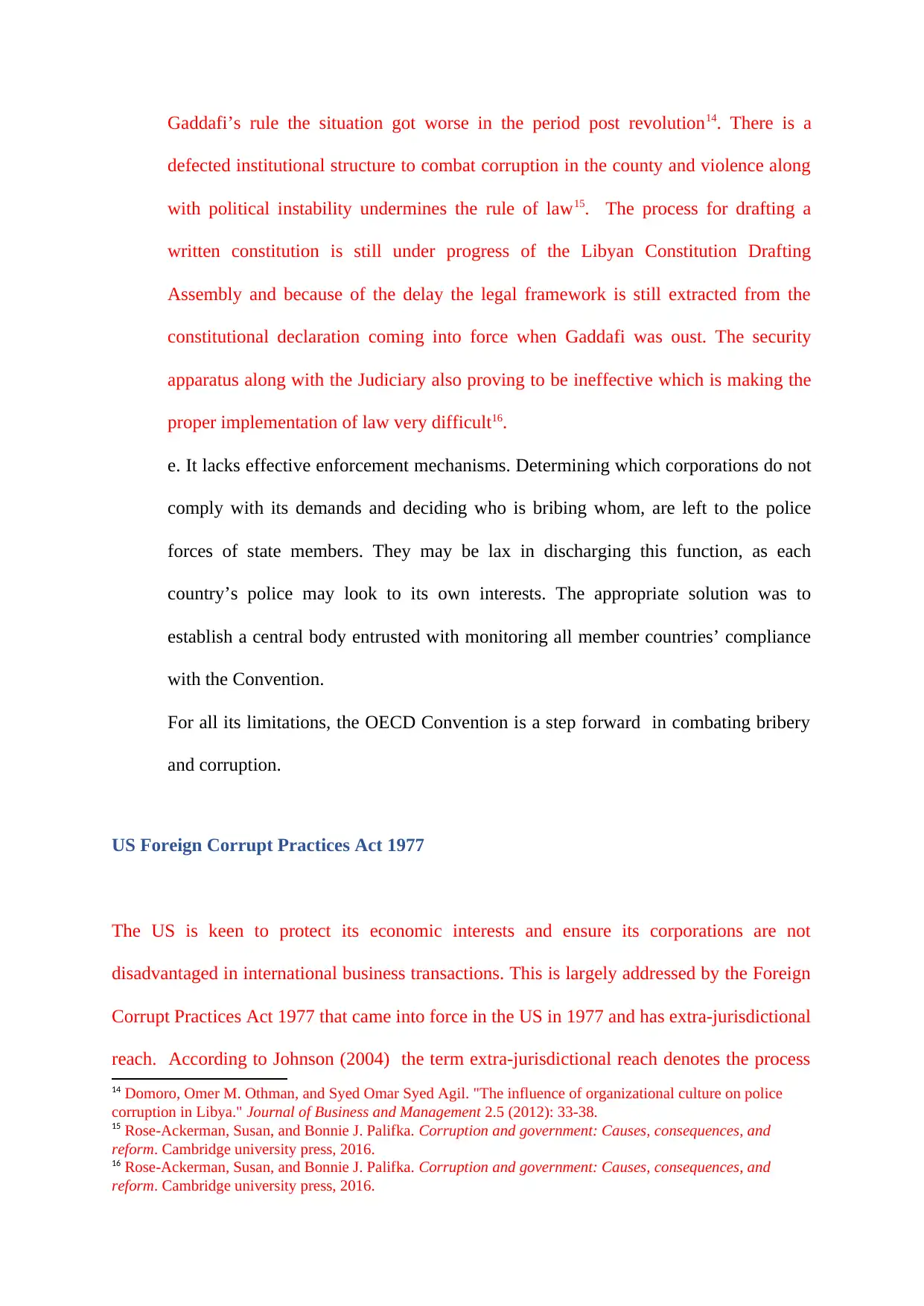
Gaddafi’s rule the situation got worse in the period post revolution14. There is a
defected institutional structure to combat corruption in the county and violence along
with political instability undermines the rule of law15. The process for drafting a
written constitution is still under progress of the Libyan Constitution Drafting
Assembly and because of the delay the legal framework is still extracted from the
constitutional declaration coming into force when Gaddafi was oust. The security
apparatus along with the Judiciary also proving to be ineffective which is making the
proper implementation of law very difficult16.
e. It lacks effective enforcement mechanisms. Determining which corporations do not
comply with its demands and deciding who is bribing whom, are left to the police
forces of state members. They may be lax in discharging this function, as each
country’s police may look to its own interests. The appropriate solution was to
establish a central body entrusted with monitoring all member countries’ compliance
with the Convention.
For all its limitations, the OECD Convention is a step forward in combating bribery
and corruption.
US Foreign Corrupt Practices Act 1977
The US is keen to protect its economic interests and ensure its corporations are not
disadvantaged in international business transactions. This is largely addressed by the Foreign
Corrupt Practices Act 1977 that came into force in the US in 1977 and has extra-jurisdictional
reach. According to Johnson (2004) the term extra-jurisdictional reach denotes the process
14 Domoro, Omer M. Othman, and Syed Omar Syed Agil. "The influence of organizational culture on police
corruption in Libya." Journal of Business and Management 2.5 (2012): 33-38.
15 Rose-Ackerman, Susan, and Bonnie J. Palifka. Corruption and government: Causes, consequences, and
reform. Cambridge university press, 2016.
16 Rose-Ackerman, Susan, and Bonnie J. Palifka. Corruption and government: Causes, consequences, and
reform. Cambridge university press, 2016.
defected institutional structure to combat corruption in the county and violence along
with political instability undermines the rule of law15. The process for drafting a
written constitution is still under progress of the Libyan Constitution Drafting
Assembly and because of the delay the legal framework is still extracted from the
constitutional declaration coming into force when Gaddafi was oust. The security
apparatus along with the Judiciary also proving to be ineffective which is making the
proper implementation of law very difficult16.
e. It lacks effective enforcement mechanisms. Determining which corporations do not
comply with its demands and deciding who is bribing whom, are left to the police
forces of state members. They may be lax in discharging this function, as each
country’s police may look to its own interests. The appropriate solution was to
establish a central body entrusted with monitoring all member countries’ compliance
with the Convention.
For all its limitations, the OECD Convention is a step forward in combating bribery
and corruption.
US Foreign Corrupt Practices Act 1977
The US is keen to protect its economic interests and ensure its corporations are not
disadvantaged in international business transactions. This is largely addressed by the Foreign
Corrupt Practices Act 1977 that came into force in the US in 1977 and has extra-jurisdictional
reach. According to Johnson (2004) the term extra-jurisdictional reach denotes the process
14 Domoro, Omer M. Othman, and Syed Omar Syed Agil. "The influence of organizational culture on police
corruption in Libya." Journal of Business and Management 2.5 (2012): 33-38.
15 Rose-Ackerman, Susan, and Bonnie J. Palifka. Corruption and government: Causes, consequences, and
reform. Cambridge university press, 2016.
16 Rose-Ackerman, Susan, and Bonnie J. Palifka. Corruption and government: Causes, consequences, and
reform. Cambridge university press, 2016.
Paraphrase This Document
Need a fresh take? Get an instant paraphrase of this document with our AI Paraphraser
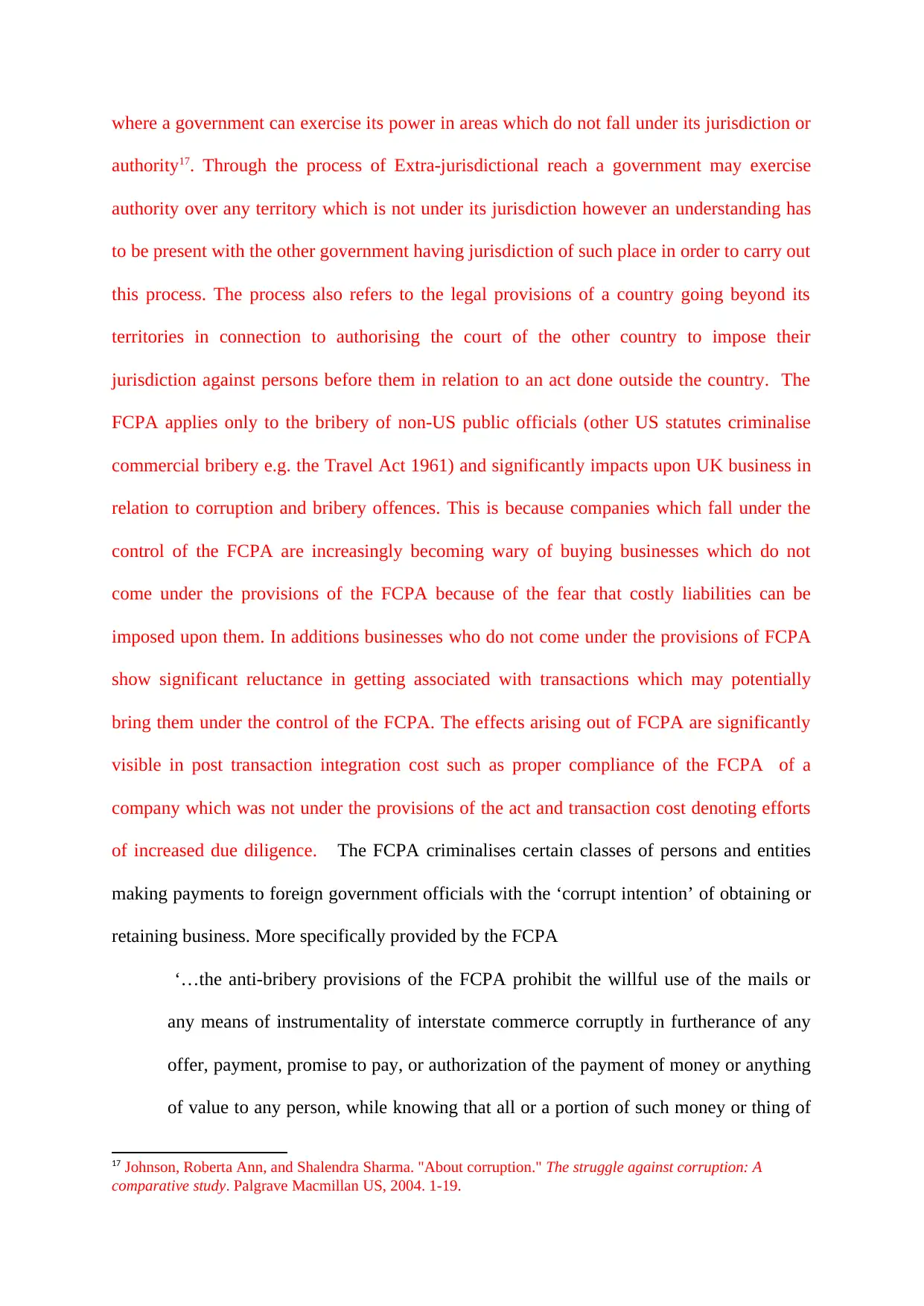
where a government can exercise its power in areas which do not fall under its jurisdiction or
authority17. Through the process of Extra-jurisdictional reach a government may exercise
authority over any territory which is not under its jurisdiction however an understanding has
to be present with the other government having jurisdiction of such place in order to carry out
this process. The process also refers to the legal provisions of a country going beyond its
territories in connection to authorising the court of the other country to impose their
jurisdiction against persons before them in relation to an act done outside the country. The
FCPA applies only to the bribery of non-US public officials (other US statutes criminalise
commercial bribery e.g. the Travel Act 1961) and significantly impacts upon UK business in
relation to corruption and bribery offences. This is because companies which fall under the
control of the FCPA are increasingly becoming wary of buying businesses which do not
come under the provisions of the FCPA because of the fear that costly liabilities can be
imposed upon them. In additions businesses who do not come under the provisions of FCPA
show significant reluctance in getting associated with transactions which may potentially
bring them under the control of the FCPA. The effects arising out of FCPA are significantly
visible in post transaction integration cost such as proper compliance of the FCPA of a
company which was not under the provisions of the act and transaction cost denoting efforts
of increased due diligence. The FCPA criminalises certain classes of persons and entities
making payments to foreign government officials with the ‘corrupt intention’ of obtaining or
retaining business. More specifically provided by the FCPA
‘…the anti-bribery provisions of the FCPA prohibit the willful use of the mails or
any means of instrumentality of interstate commerce corruptly in furtherance of any
offer, payment, promise to pay, or authorization of the payment of money or anything
of value to any person, while knowing that all or a portion of such money or thing of
17 Johnson, Roberta Ann, and Shalendra Sharma. "About corruption." The struggle against corruption: A
comparative study. Palgrave Macmillan US, 2004. 1-19.
authority17. Through the process of Extra-jurisdictional reach a government may exercise
authority over any territory which is not under its jurisdiction however an understanding has
to be present with the other government having jurisdiction of such place in order to carry out
this process. The process also refers to the legal provisions of a country going beyond its
territories in connection to authorising the court of the other country to impose their
jurisdiction against persons before them in relation to an act done outside the country. The
FCPA applies only to the bribery of non-US public officials (other US statutes criminalise
commercial bribery e.g. the Travel Act 1961) and significantly impacts upon UK business in
relation to corruption and bribery offences. This is because companies which fall under the
control of the FCPA are increasingly becoming wary of buying businesses which do not
come under the provisions of the FCPA because of the fear that costly liabilities can be
imposed upon them. In additions businesses who do not come under the provisions of FCPA
show significant reluctance in getting associated with transactions which may potentially
bring them under the control of the FCPA. The effects arising out of FCPA are significantly
visible in post transaction integration cost such as proper compliance of the FCPA of a
company which was not under the provisions of the act and transaction cost denoting efforts
of increased due diligence. The FCPA criminalises certain classes of persons and entities
making payments to foreign government officials with the ‘corrupt intention’ of obtaining or
retaining business. More specifically provided by the FCPA
‘…the anti-bribery provisions of the FCPA prohibit the willful use of the mails or
any means of instrumentality of interstate commerce corruptly in furtherance of any
offer, payment, promise to pay, or authorization of the payment of money or anything
of value to any person, while knowing that all or a portion of such money or thing of
17 Johnson, Roberta Ann, and Shalendra Sharma. "About corruption." The struggle against corruption: A
comparative study. Palgrave Macmillan US, 2004. 1-19.
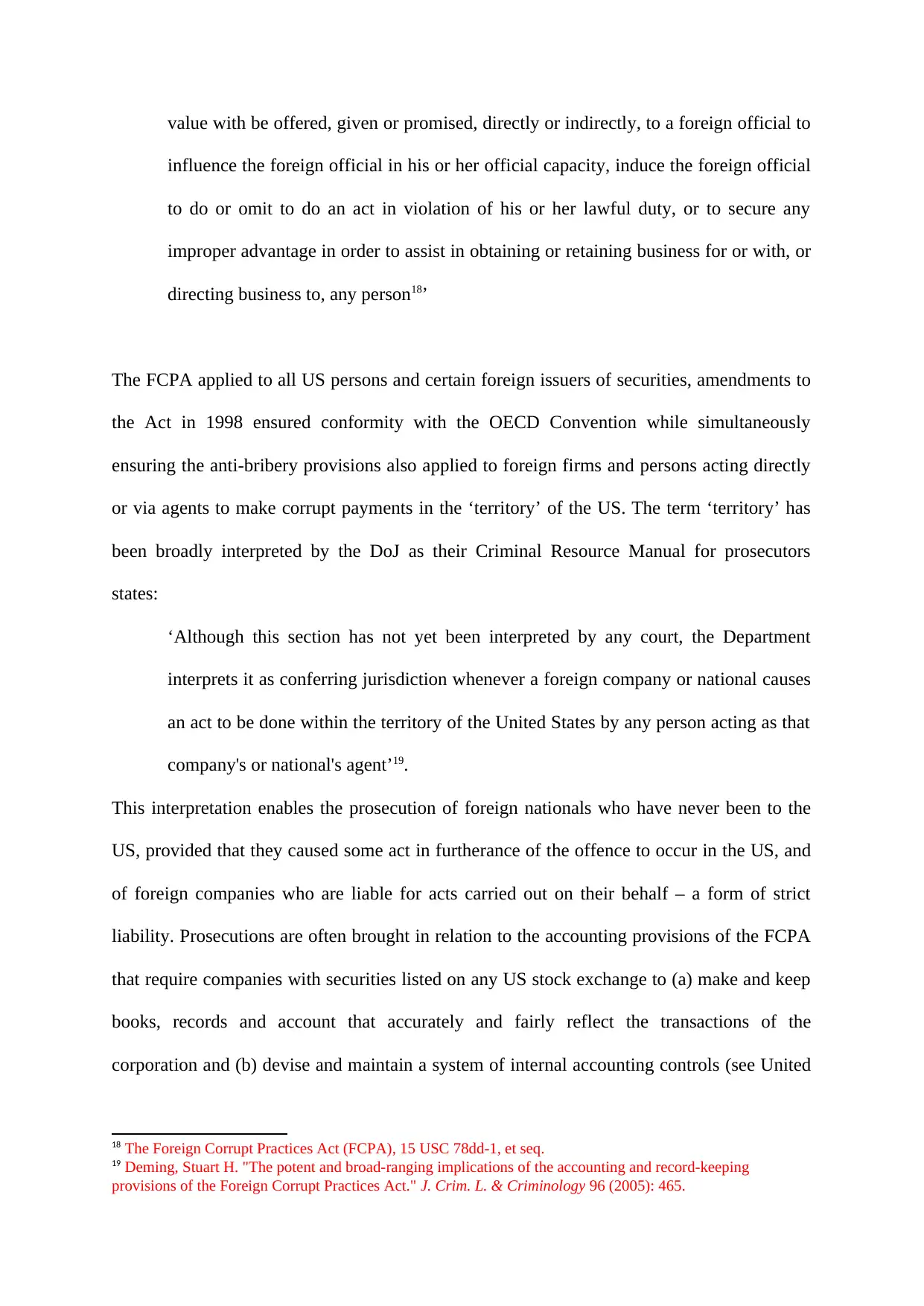
value with be offered, given or promised, directly or indirectly, to a foreign official to
influence the foreign official in his or her official capacity, induce the foreign official
to do or omit to do an act in violation of his or her lawful duty, or to secure any
improper advantage in order to assist in obtaining or retaining business for or with, or
directing business to, any person18’
The FCPA applied to all US persons and certain foreign issuers of securities, amendments to
the Act in 1998 ensured conformity with the OECD Convention while simultaneously
ensuring the anti-bribery provisions also applied to foreign firms and persons acting directly
or via agents to make corrupt payments in the ‘territory’ of the US. The term ‘territory’ has
been broadly interpreted by the DoJ as their Criminal Resource Manual for prosecutors
states:
‘Although this section has not yet been interpreted by any court, the Department
interprets it as conferring jurisdiction whenever a foreign company or national causes
an act to be done within the territory of the United States by any person acting as that
company's or national's agent’19.
This interpretation enables the prosecution of foreign nationals who have never been to the
US, provided that they caused some act in furtherance of the offence to occur in the US, and
of foreign companies who are liable for acts carried out on their behalf – a form of strict
liability. Prosecutions are often brought in relation to the accounting provisions of the FCPA
that require companies with securities listed on any US stock exchange to (a) make and keep
books, records and account that accurately and fairly reflect the transactions of the
corporation and (b) devise and maintain a system of internal accounting controls (see United
18 The Foreign Corrupt Practices Act (FCPA), 15 USC 78dd-1, et seq.
19 Deming, Stuart H. "The potent and broad-ranging implications of the accounting and record-keeping
provisions of the Foreign Corrupt Practices Act." J. Crim. L. & Criminology 96 (2005): 465.
influence the foreign official in his or her official capacity, induce the foreign official
to do or omit to do an act in violation of his or her lawful duty, or to secure any
improper advantage in order to assist in obtaining or retaining business for or with, or
directing business to, any person18’
The FCPA applied to all US persons and certain foreign issuers of securities, amendments to
the Act in 1998 ensured conformity with the OECD Convention while simultaneously
ensuring the anti-bribery provisions also applied to foreign firms and persons acting directly
or via agents to make corrupt payments in the ‘territory’ of the US. The term ‘territory’ has
been broadly interpreted by the DoJ as their Criminal Resource Manual for prosecutors
states:
‘Although this section has not yet been interpreted by any court, the Department
interprets it as conferring jurisdiction whenever a foreign company or national causes
an act to be done within the territory of the United States by any person acting as that
company's or national's agent’19.
This interpretation enables the prosecution of foreign nationals who have never been to the
US, provided that they caused some act in furtherance of the offence to occur in the US, and
of foreign companies who are liable for acts carried out on their behalf – a form of strict
liability. Prosecutions are often brought in relation to the accounting provisions of the FCPA
that require companies with securities listed on any US stock exchange to (a) make and keep
books, records and account that accurately and fairly reflect the transactions of the
corporation and (b) devise and maintain a system of internal accounting controls (see United
18 The Foreign Corrupt Practices Act (FCPA), 15 USC 78dd-1, et seq.
19 Deming, Stuart H. "The potent and broad-ranging implications of the accounting and record-keeping
provisions of the Foreign Corrupt Practices Act." J. Crim. L. & Criminology 96 (2005): 465.
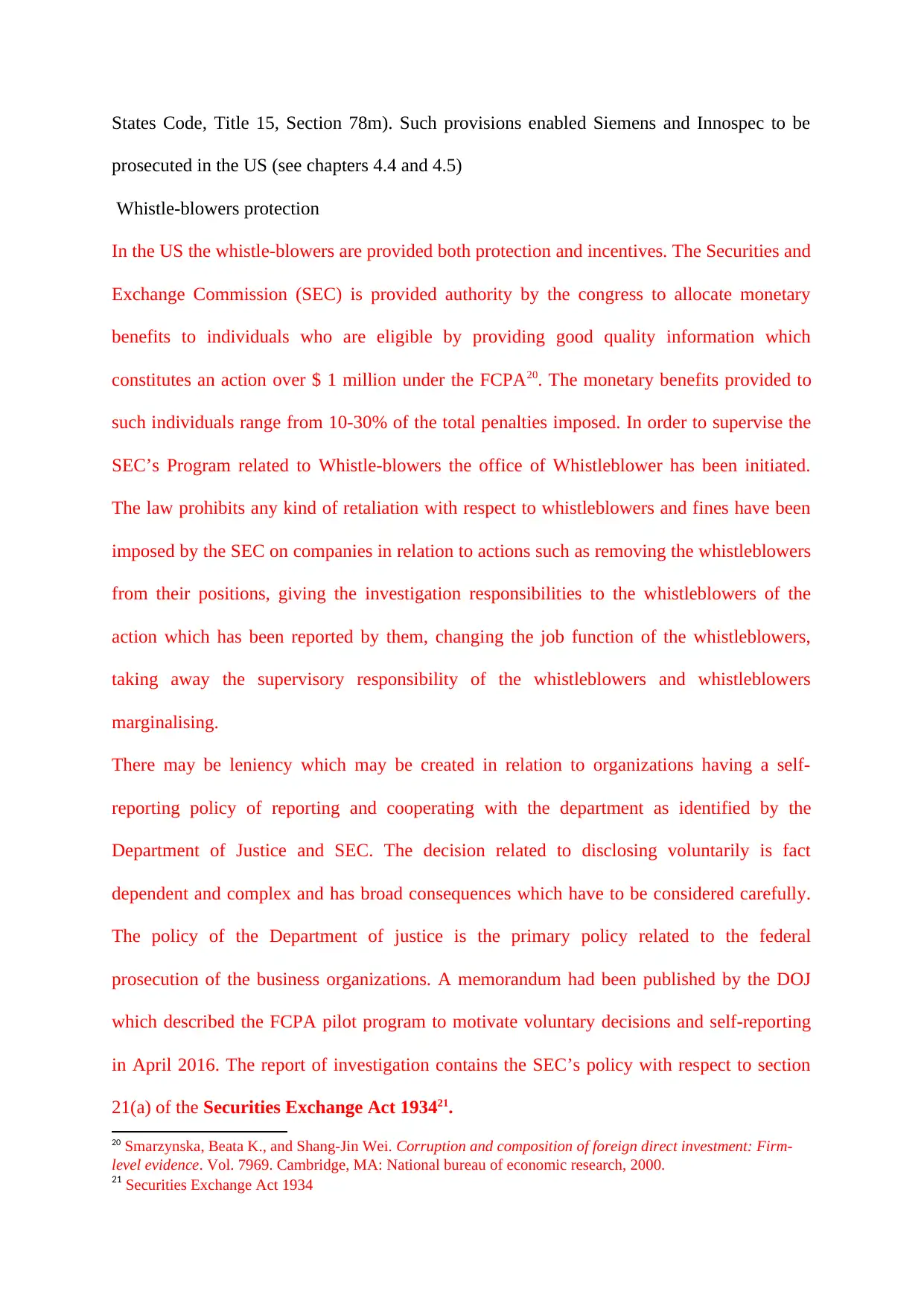
States Code, Title 15, Section 78m). Such provisions enabled Siemens and Innospec to be
prosecuted in the US (see chapters 4.4 and 4.5)
Whistle-blowers protection
In the US the whistle-blowers are provided both protection and incentives. The Securities and
Exchange Commission (SEC) is provided authority by the congress to allocate monetary
benefits to individuals who are eligible by providing good quality information which
constitutes an action over $ 1 million under the FCPA20. The monetary benefits provided to
such individuals range from 10-30% of the total penalties imposed. In order to supervise the
SEC’s Program related to Whistle-blowers the office of Whistleblower has been initiated.
The law prohibits any kind of retaliation with respect to whistleblowers and fines have been
imposed by the SEC on companies in relation to actions such as removing the whistleblowers
from their positions, giving the investigation responsibilities to the whistleblowers of the
action which has been reported by them, changing the job function of the whistleblowers,
taking away the supervisory responsibility of the whistleblowers and whistleblowers
marginalising.
There may be leniency which may be created in relation to organizations having a self-
reporting policy of reporting and cooperating with the department as identified by the
Department of Justice and SEC. The decision related to disclosing voluntarily is fact
dependent and complex and has broad consequences which have to be considered carefully.
The policy of the Department of justice is the primary policy related to the federal
prosecution of the business organizations. A memorandum had been published by the DOJ
which described the FCPA pilot program to motivate voluntary decisions and self-reporting
in April 2016. The report of investigation contains the SEC’s policy with respect to section
21(a) of the Securities Exchange Act 193421.
20 Smarzynska, Beata K., and Shang-Jin Wei. Corruption and composition of foreign direct investment: Firm-
level evidence. Vol. 7969. Cambridge, MA: National bureau of economic research, 2000.
21 Securities Exchange Act 1934
prosecuted in the US (see chapters 4.4 and 4.5)
Whistle-blowers protection
In the US the whistle-blowers are provided both protection and incentives. The Securities and
Exchange Commission (SEC) is provided authority by the congress to allocate monetary
benefits to individuals who are eligible by providing good quality information which
constitutes an action over $ 1 million under the FCPA20. The monetary benefits provided to
such individuals range from 10-30% of the total penalties imposed. In order to supervise the
SEC’s Program related to Whistle-blowers the office of Whistleblower has been initiated.
The law prohibits any kind of retaliation with respect to whistleblowers and fines have been
imposed by the SEC on companies in relation to actions such as removing the whistleblowers
from their positions, giving the investigation responsibilities to the whistleblowers of the
action which has been reported by them, changing the job function of the whistleblowers,
taking away the supervisory responsibility of the whistleblowers and whistleblowers
marginalising.
There may be leniency which may be created in relation to organizations having a self-
reporting policy of reporting and cooperating with the department as identified by the
Department of Justice and SEC. The decision related to disclosing voluntarily is fact
dependent and complex and has broad consequences which have to be considered carefully.
The policy of the Department of justice is the primary policy related to the federal
prosecution of the business organizations. A memorandum had been published by the DOJ
which described the FCPA pilot program to motivate voluntary decisions and self-reporting
in April 2016. The report of investigation contains the SEC’s policy with respect to section
21(a) of the Securities Exchange Act 193421.
20 Smarzynska, Beata K., and Shang-Jin Wei. Corruption and composition of foreign direct investment: Firm-
level evidence. Vol. 7969. Cambridge, MA: National bureau of economic research, 2000.
21 Securities Exchange Act 1934
Secure Best Marks with AI Grader
Need help grading? Try our AI Grader for instant feedback on your assignments.
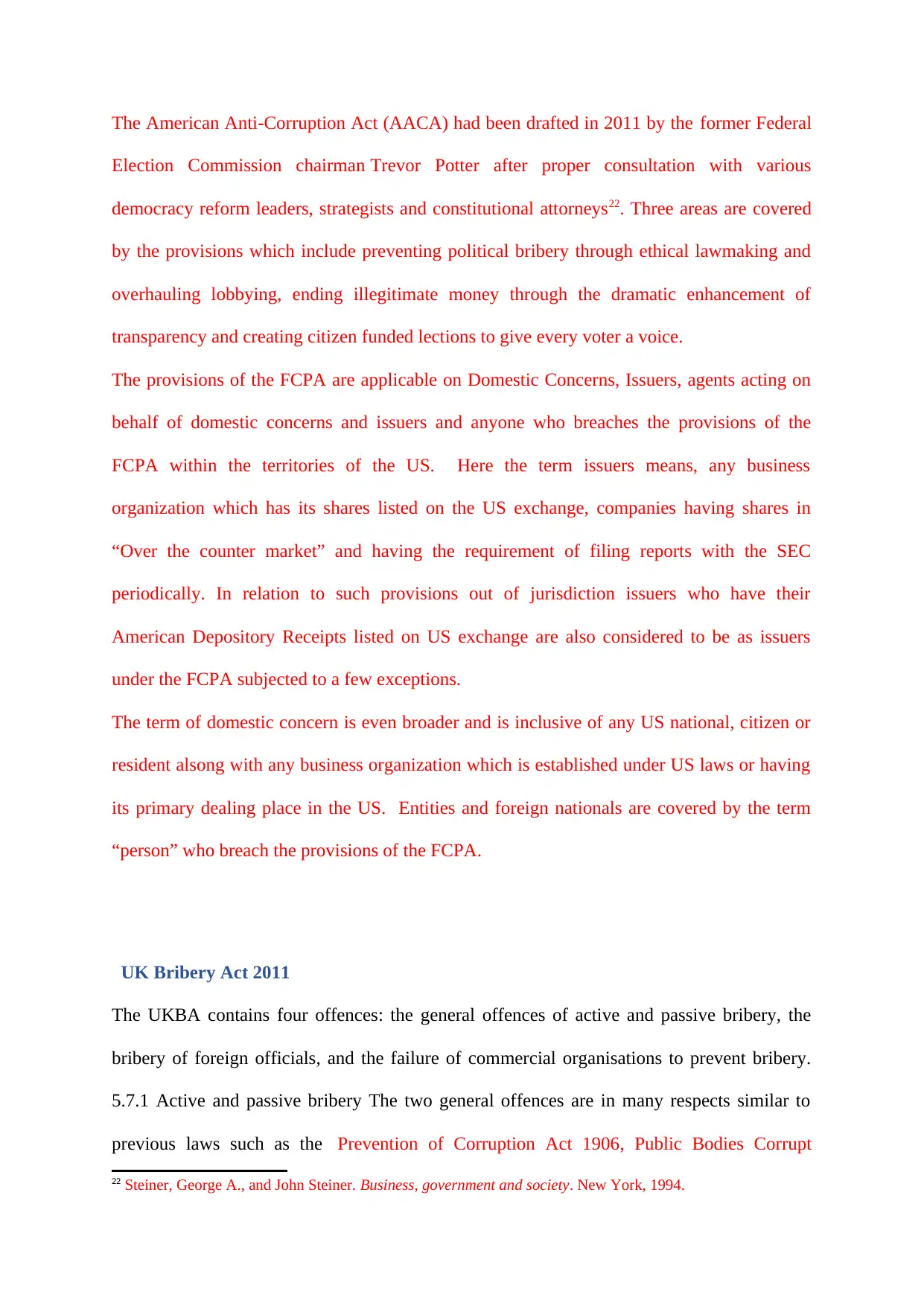
The American Anti-Corruption Act (AACA) had been drafted in 2011 by the former Federal
Election Commission chairman Trevor Potter after proper consultation with various
democracy reform leaders, strategists and constitutional attorneys22. Three areas are covered
by the provisions which include preventing political bribery through ethical lawmaking and
overhauling lobbying, ending illegitimate money through the dramatic enhancement of
transparency and creating citizen funded lections to give every voter a voice.
The provisions of the FCPA are applicable on Domestic Concerns, Issuers, agents acting on
behalf of domestic concerns and issuers and anyone who breaches the provisions of the
FCPA within the territories of the US. Here the term issuers means, any business
organization which has its shares listed on the US exchange, companies having shares in
“Over the counter market” and having the requirement of filing reports with the SEC
periodically. In relation to such provisions out of jurisdiction issuers who have their
American Depository Receipts listed on US exchange are also considered to be as issuers
under the FCPA subjected to a few exceptions.
The term of domestic concern is even broader and is inclusive of any US national, citizen or
resident alsong with any business organization which is established under US laws or having
its primary dealing place in the US. Entities and foreign nationals are covered by the term
“person” who breach the provisions of the FCPA.
UK Bribery Act 2011
The UKBA contains four offences: the general offences of active and passive bribery, the
bribery of foreign officials, and the failure of commercial organisations to prevent bribery.
5.7.1 Active and passive bribery The two general offences are in many respects similar to
previous laws such as the Prevention of Corruption Act 1906, Public Bodies Corrupt
22 Steiner, George A., and John Steiner. Business, government and society. New York, 1994.
Election Commission chairman Trevor Potter after proper consultation with various
democracy reform leaders, strategists and constitutional attorneys22. Three areas are covered
by the provisions which include preventing political bribery through ethical lawmaking and
overhauling lobbying, ending illegitimate money through the dramatic enhancement of
transparency and creating citizen funded lections to give every voter a voice.
The provisions of the FCPA are applicable on Domestic Concerns, Issuers, agents acting on
behalf of domestic concerns and issuers and anyone who breaches the provisions of the
FCPA within the territories of the US. Here the term issuers means, any business
organization which has its shares listed on the US exchange, companies having shares in
“Over the counter market” and having the requirement of filing reports with the SEC
periodically. In relation to such provisions out of jurisdiction issuers who have their
American Depository Receipts listed on US exchange are also considered to be as issuers
under the FCPA subjected to a few exceptions.
The term of domestic concern is even broader and is inclusive of any US national, citizen or
resident alsong with any business organization which is established under US laws or having
its primary dealing place in the US. Entities and foreign nationals are covered by the term
“person” who breach the provisions of the FCPA.
UK Bribery Act 2011
The UKBA contains four offences: the general offences of active and passive bribery, the
bribery of foreign officials, and the failure of commercial organisations to prevent bribery.
5.7.1 Active and passive bribery The two general offences are in many respects similar to
previous laws such as the Prevention of Corruption Act 1906, Public Bodies Corrupt
22 Steiner, George A., and John Steiner. Business, government and society. New York, 1994.
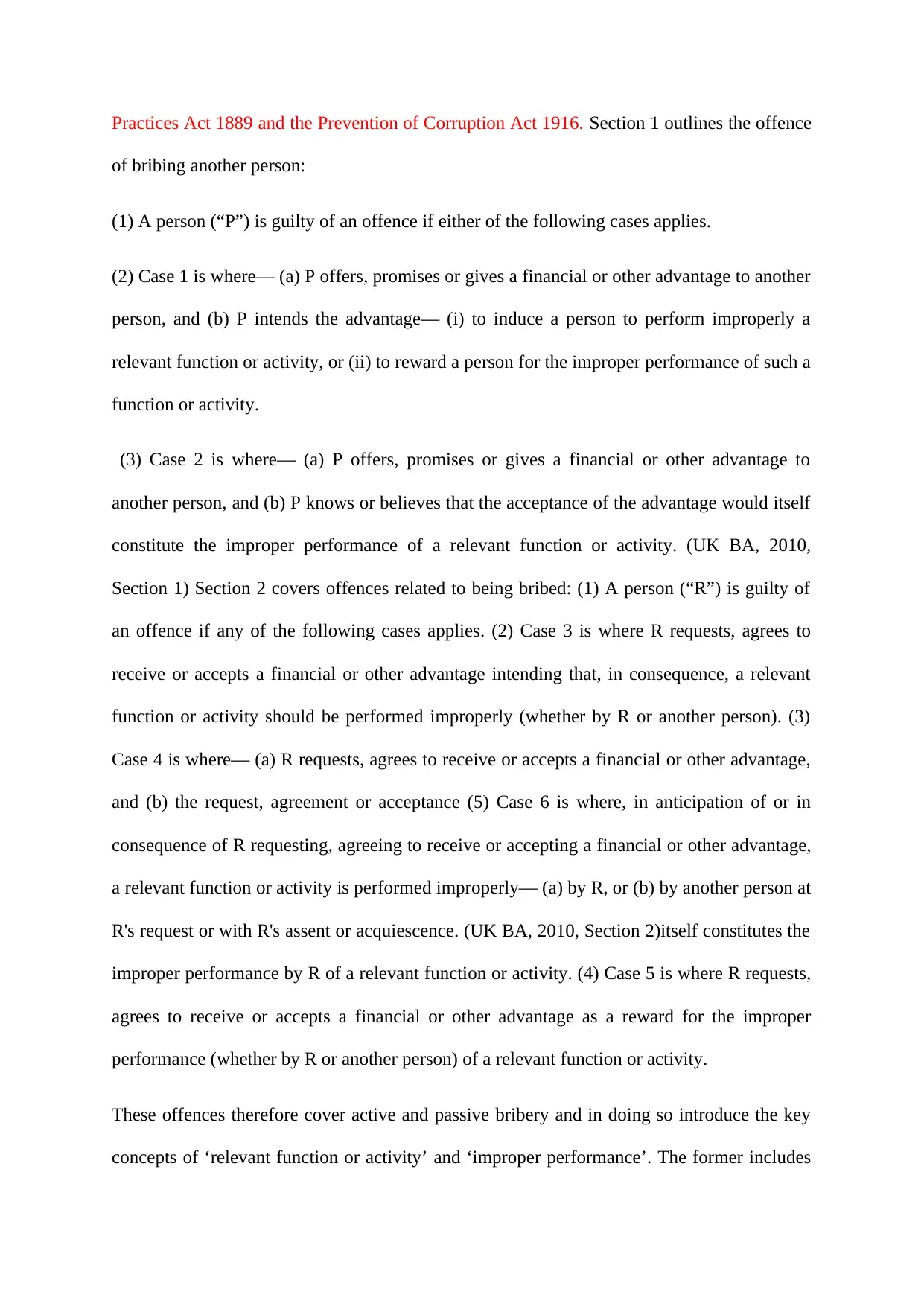
Practices Act 1889 and the Prevention of Corruption Act 1916. Section 1 outlines the offence
of bribing another person:
(1) A person (“P”) is guilty of an offence if either of the following cases applies.
(2) Case 1 is where— (a) P offers, promises or gives a financial or other advantage to another
person, and (b) P intends the advantage— (i) to induce a person to perform improperly a
relevant function or activity, or (ii) to reward a person for the improper performance of such a
function or activity.
(3) Case 2 is where— (a) P offers, promises or gives a financial or other advantage to
another person, and (b) P knows or believes that the acceptance of the advantage would itself
constitute the improper performance of a relevant function or activity. (UK BA, 2010,
Section 1) Section 2 covers offences related to being bribed: (1) A person (“R”) is guilty of
an offence if any of the following cases applies. (2) Case 3 is where R requests, agrees to
receive or accepts a financial or other advantage intending that, in consequence, a relevant
function or activity should be performed improperly (whether by R or another person). (3)
Case 4 is where— (a) R requests, agrees to receive or accepts a financial or other advantage,
and (b) the request, agreement or acceptance (5) Case 6 is where, in anticipation of or in
consequence of R requesting, agreeing to receive or accepting a financial or other advantage,
a relevant function or activity is performed improperly— (a) by R, or (b) by another person at
R's request or with R's assent or acquiescence. (UK BA, 2010, Section 2)itself constitutes the
improper performance by R of a relevant function or activity. (4) Case 5 is where R requests,
agrees to receive or accepts a financial or other advantage as a reward for the improper
performance (whether by R or another person) of a relevant function or activity.
These offences therefore cover active and passive bribery and in doing so introduce the key
concepts of ‘relevant function or activity’ and ‘improper performance’. The former includes
of bribing another person:
(1) A person (“P”) is guilty of an offence if either of the following cases applies.
(2) Case 1 is where— (a) P offers, promises or gives a financial or other advantage to another
person, and (b) P intends the advantage— (i) to induce a person to perform improperly a
relevant function or activity, or (ii) to reward a person for the improper performance of such a
function or activity.
(3) Case 2 is where— (a) P offers, promises or gives a financial or other advantage to
another person, and (b) P knows or believes that the acceptance of the advantage would itself
constitute the improper performance of a relevant function or activity. (UK BA, 2010,
Section 1) Section 2 covers offences related to being bribed: (1) A person (“R”) is guilty of
an offence if any of the following cases applies. (2) Case 3 is where R requests, agrees to
receive or accepts a financial or other advantage intending that, in consequence, a relevant
function or activity should be performed improperly (whether by R or another person). (3)
Case 4 is where— (a) R requests, agrees to receive or accepts a financial or other advantage,
and (b) the request, agreement or acceptance (5) Case 6 is where, in anticipation of or in
consequence of R requesting, agreeing to receive or accepting a financial or other advantage,
a relevant function or activity is performed improperly— (a) by R, or (b) by another person at
R's request or with R's assent or acquiescence. (UK BA, 2010, Section 2)itself constitutes the
improper performance by R of a relevant function or activity. (4) Case 5 is where R requests,
agrees to receive or accepts a financial or other advantage as a reward for the improper
performance (whether by R or another person) of a relevant function or activity.
These offences therefore cover active and passive bribery and in doing so introduce the key
concepts of ‘relevant function or activity’ and ‘improper performance’. The former includes
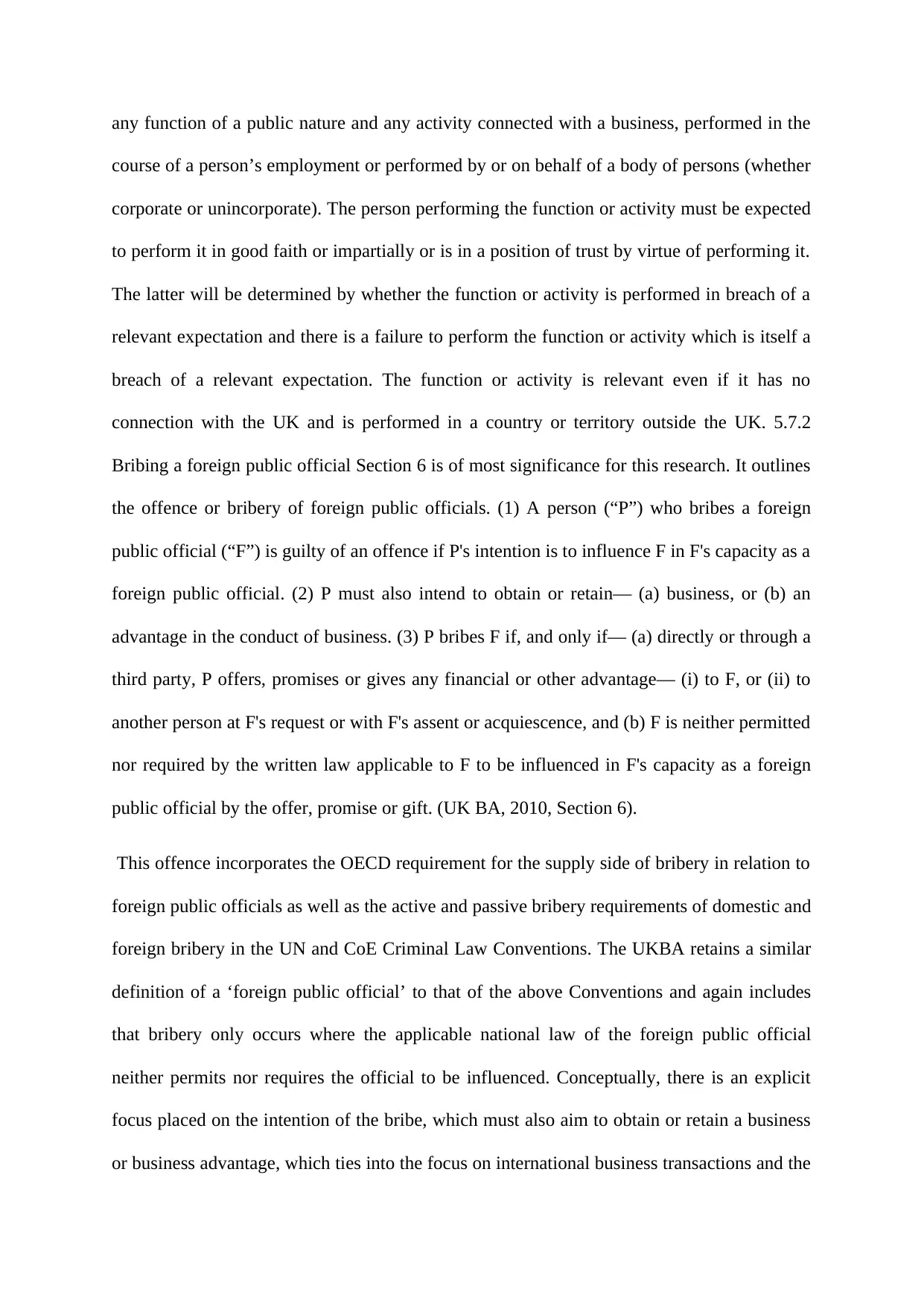
any function of a public nature and any activity connected with a business, performed in the
course of a person’s employment or performed by or on behalf of a body of persons (whether
corporate or unincorporate). The person performing the function or activity must be expected
to perform it in good faith or impartially or is in a position of trust by virtue of performing it.
The latter will be determined by whether the function or activity is performed in breach of a
relevant expectation and there is a failure to perform the function or activity which is itself a
breach of a relevant expectation. The function or activity is relevant even if it has no
connection with the UK and is performed in a country or territory outside the UK. 5.7.2
Bribing a foreign public official Section 6 is of most significance for this research. It outlines
the offence or bribery of foreign public officials. (1) A person (“P”) who bribes a foreign
public official (“F”) is guilty of an offence if P's intention is to influence F in F's capacity as a
foreign public official. (2) P must also intend to obtain or retain— (a) business, or (b) an
advantage in the conduct of business. (3) P bribes F if, and only if— (a) directly or through a
third party, P offers, promises or gives any financial or other advantage— (i) to F, or (ii) to
another person at F's request or with F's assent or acquiescence, and (b) F is neither permitted
nor required by the written law applicable to F to be influenced in F's capacity as a foreign
public official by the offer, promise or gift. (UK BA, 2010, Section 6).
This offence incorporates the OECD requirement for the supply side of bribery in relation to
foreign public officials as well as the active and passive bribery requirements of domestic and
foreign bribery in the UN and CoE Criminal Law Conventions. The UKBA retains a similar
definition of a ‘foreign public official’ to that of the above Conventions and again includes
that bribery only occurs where the applicable national law of the foreign public official
neither permits nor requires the official to be influenced. Conceptually, there is an explicit
focus placed on the intention of the bribe, which must also aim to obtain or retain a business
or business advantage, which ties into the focus on international business transactions and the
course of a person’s employment or performed by or on behalf of a body of persons (whether
corporate or unincorporate). The person performing the function or activity must be expected
to perform it in good faith or impartially or is in a position of trust by virtue of performing it.
The latter will be determined by whether the function or activity is performed in breach of a
relevant expectation and there is a failure to perform the function or activity which is itself a
breach of a relevant expectation. The function or activity is relevant even if it has no
connection with the UK and is performed in a country or territory outside the UK. 5.7.2
Bribing a foreign public official Section 6 is of most significance for this research. It outlines
the offence or bribery of foreign public officials. (1) A person (“P”) who bribes a foreign
public official (“F”) is guilty of an offence if P's intention is to influence F in F's capacity as a
foreign public official. (2) P must also intend to obtain or retain— (a) business, or (b) an
advantage in the conduct of business. (3) P bribes F if, and only if— (a) directly or through a
third party, P offers, promises or gives any financial or other advantage— (i) to F, or (ii) to
another person at F's request or with F's assent or acquiescence, and (b) F is neither permitted
nor required by the written law applicable to F to be influenced in F's capacity as a foreign
public official by the offer, promise or gift. (UK BA, 2010, Section 6).
This offence incorporates the OECD requirement for the supply side of bribery in relation to
foreign public officials as well as the active and passive bribery requirements of domestic and
foreign bribery in the UN and CoE Criminal Law Conventions. The UKBA retains a similar
definition of a ‘foreign public official’ to that of the above Conventions and again includes
that bribery only occurs where the applicable national law of the foreign public official
neither permits nor requires the official to be influenced. Conceptually, there is an explicit
focus placed on the intention of the bribe, which must also aim to obtain or retain a business
or business advantage, which ties into the focus on international business transactions and the
Paraphrase This Document
Need a fresh take? Get an instant paraphrase of this document with our AI Paraphraser
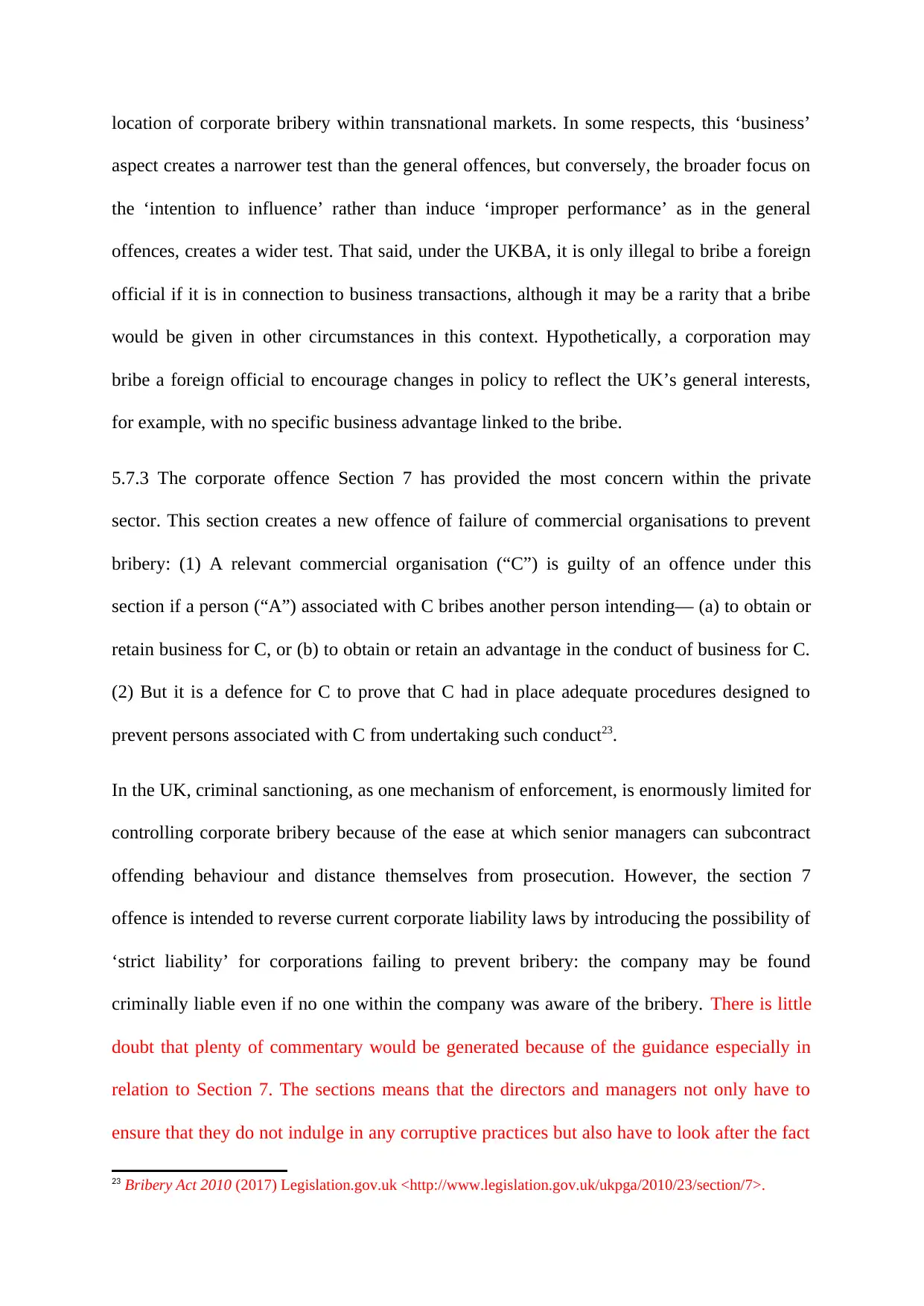
location of corporate bribery within transnational markets. In some respects, this ‘business’
aspect creates a narrower test than the general offences, but conversely, the broader focus on
the ‘intention to influence’ rather than induce ‘improper performance’ as in the general
offences, creates a wider test. That said, under the UKBA, it is only illegal to bribe a foreign
official if it is in connection to business transactions, although it may be a rarity that a bribe
would be given in other circumstances in this context. Hypothetically, a corporation may
bribe a foreign official to encourage changes in policy to reflect the UK’s general interests,
for example, with no specific business advantage linked to the bribe.
5.7.3 The corporate offence Section 7 has provided the most concern within the private
sector. This section creates a new offence of failure of commercial organisations to prevent
bribery: (1) A relevant commercial organisation (“C”) is guilty of an offence under this
section if a person (“A”) associated with C bribes another person intending— (a) to obtain or
retain business for C, or (b) to obtain or retain an advantage in the conduct of business for C.
(2) But it is a defence for C to prove that C had in place adequate procedures designed to
prevent persons associated with C from undertaking such conduct23.
In the UK, criminal sanctioning, as one mechanism of enforcement, is enormously limited for
controlling corporate bribery because of the ease at which senior managers can subcontract
offending behaviour and distance themselves from prosecution. However, the section 7
offence is intended to reverse current corporate liability laws by introducing the possibility of
‘strict liability’ for corporations failing to prevent bribery: the company may be found
criminally liable even if no one within the company was aware of the bribery. There is little
doubt that plenty of commentary would be generated because of the guidance especially in
relation to Section 7. The sections means that the directors and managers not only have to
ensure that they do not indulge in any corruptive practices but also have to look after the fact
23 Bribery Act 2010 (2017) Legislation.gov.uk <http://www.legislation.gov.uk/ukpga/2010/23/section/7>.
aspect creates a narrower test than the general offences, but conversely, the broader focus on
the ‘intention to influence’ rather than induce ‘improper performance’ as in the general
offences, creates a wider test. That said, under the UKBA, it is only illegal to bribe a foreign
official if it is in connection to business transactions, although it may be a rarity that a bribe
would be given in other circumstances in this context. Hypothetically, a corporation may
bribe a foreign official to encourage changes in policy to reflect the UK’s general interests,
for example, with no specific business advantage linked to the bribe.
5.7.3 The corporate offence Section 7 has provided the most concern within the private
sector. This section creates a new offence of failure of commercial organisations to prevent
bribery: (1) A relevant commercial organisation (“C”) is guilty of an offence under this
section if a person (“A”) associated with C bribes another person intending— (a) to obtain or
retain business for C, or (b) to obtain or retain an advantage in the conduct of business for C.
(2) But it is a defence for C to prove that C had in place adequate procedures designed to
prevent persons associated with C from undertaking such conduct23.
In the UK, criminal sanctioning, as one mechanism of enforcement, is enormously limited for
controlling corporate bribery because of the ease at which senior managers can subcontract
offending behaviour and distance themselves from prosecution. However, the section 7
offence is intended to reverse current corporate liability laws by introducing the possibility of
‘strict liability’ for corporations failing to prevent bribery: the company may be found
criminally liable even if no one within the company was aware of the bribery. There is little
doubt that plenty of commentary would be generated because of the guidance especially in
relation to Section 7. The sections means that the directors and managers not only have to
ensure that they do not indulge in any corruptive practices but also have to look after the fact
23 Bribery Act 2010 (2017) Legislation.gov.uk <http://www.legislation.gov.uk/ukpga/2010/23/section/7>.
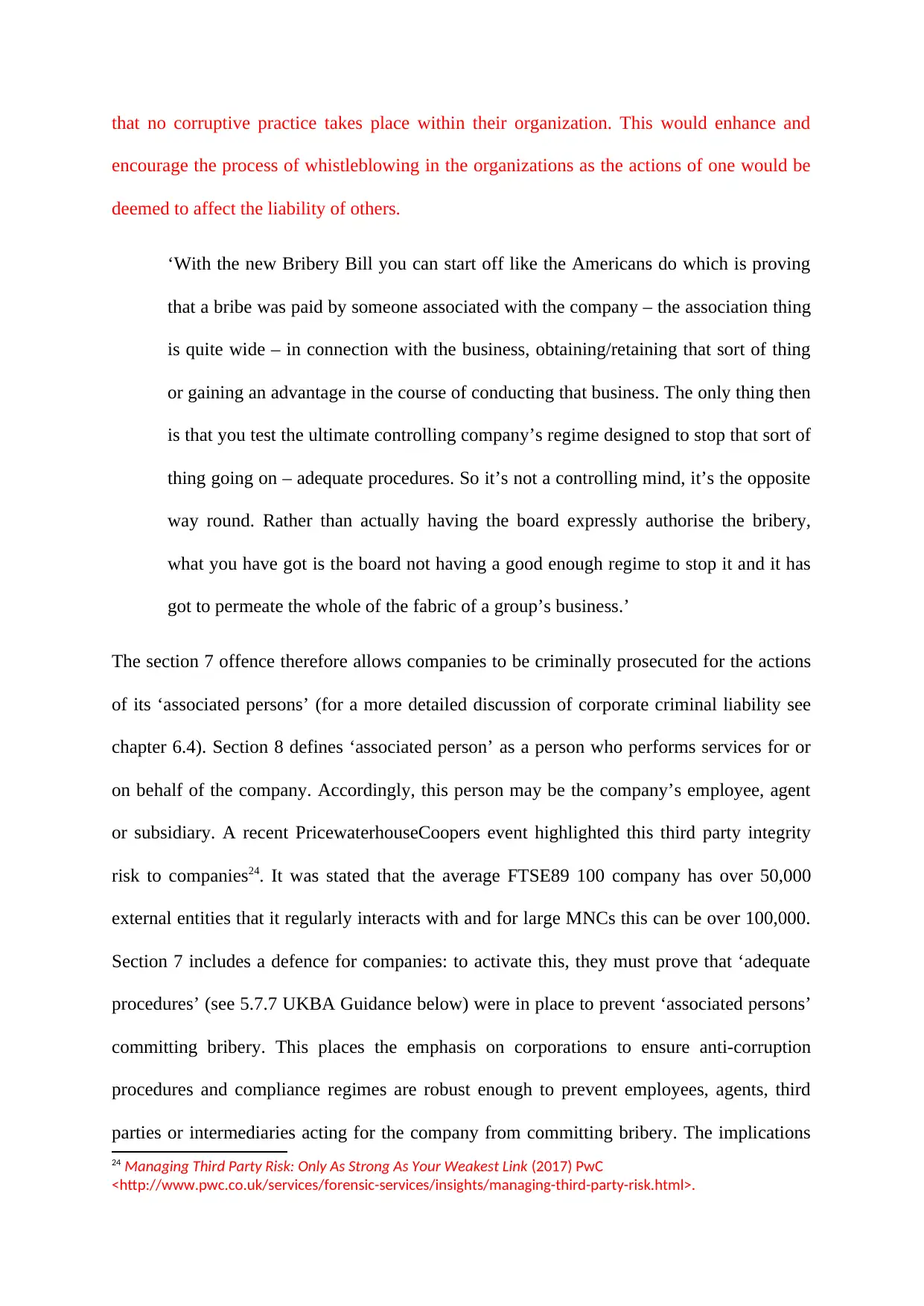
that no corruptive practice takes place within their organization. This would enhance and
encourage the process of whistleblowing in the organizations as the actions of one would be
deemed to affect the liability of others.
‘With the new Bribery Bill you can start off like the Americans do which is proving
that a bribe was paid by someone associated with the company – the association thing
is quite wide – in connection with the business, obtaining/retaining that sort of thing
or gaining an advantage in the course of conducting that business. The only thing then
is that you test the ultimate controlling company’s regime designed to stop that sort of
thing going on – adequate procedures. So it’s not a controlling mind, it’s the opposite
way round. Rather than actually having the board expressly authorise the bribery,
what you have got is the board not having a good enough regime to stop it and it has
got to permeate the whole of the fabric of a group’s business.’
The section 7 offence therefore allows companies to be criminally prosecuted for the actions
of its ‘associated persons’ (for a more detailed discussion of corporate criminal liability see
chapter 6.4). Section 8 defines ‘associated person’ as a person who performs services for or
on behalf of the company. Accordingly, this person may be the company’s employee, agent
or subsidiary. A recent PricewaterhouseCoopers event highlighted this third party integrity
risk to companies24. It was stated that the average FTSE89 100 company has over 50,000
external entities that it regularly interacts with and for large MNCs this can be over 100,000.
Section 7 includes a defence for companies: to activate this, they must prove that ‘adequate
procedures’ (see 5.7.7 UKBA Guidance below) were in place to prevent ‘associated persons’
committing bribery. This places the emphasis on corporations to ensure anti-corruption
procedures and compliance regimes are robust enough to prevent employees, agents, third
parties or intermediaries acting for the company from committing bribery. The implications
24 Managing Third Party Risk: Only As Strong As Your Weakest Link (2017) PwC
<http://www.pwc.co.uk/services/forensic-services/insights/managing-third-party-risk.html>.
encourage the process of whistleblowing in the organizations as the actions of one would be
deemed to affect the liability of others.
‘With the new Bribery Bill you can start off like the Americans do which is proving
that a bribe was paid by someone associated with the company – the association thing
is quite wide – in connection with the business, obtaining/retaining that sort of thing
or gaining an advantage in the course of conducting that business. The only thing then
is that you test the ultimate controlling company’s regime designed to stop that sort of
thing going on – adequate procedures. So it’s not a controlling mind, it’s the opposite
way round. Rather than actually having the board expressly authorise the bribery,
what you have got is the board not having a good enough regime to stop it and it has
got to permeate the whole of the fabric of a group’s business.’
The section 7 offence therefore allows companies to be criminally prosecuted for the actions
of its ‘associated persons’ (for a more detailed discussion of corporate criminal liability see
chapter 6.4). Section 8 defines ‘associated person’ as a person who performs services for or
on behalf of the company. Accordingly, this person may be the company’s employee, agent
or subsidiary. A recent PricewaterhouseCoopers event highlighted this third party integrity
risk to companies24. It was stated that the average FTSE89 100 company has over 50,000
external entities that it regularly interacts with and for large MNCs this can be over 100,000.
Section 7 includes a defence for companies: to activate this, they must prove that ‘adequate
procedures’ (see 5.7.7 UKBA Guidance below) were in place to prevent ‘associated persons’
committing bribery. This places the emphasis on corporations to ensure anti-corruption
procedures and compliance regimes are robust enough to prevent employees, agents, third
parties or intermediaries acting for the company from committing bribery. The implications
24 Managing Third Party Risk: Only As Strong As Your Weakest Link (2017) PwC
<http://www.pwc.co.uk/services/forensic-services/insights/managing-third-party-risk.html>.
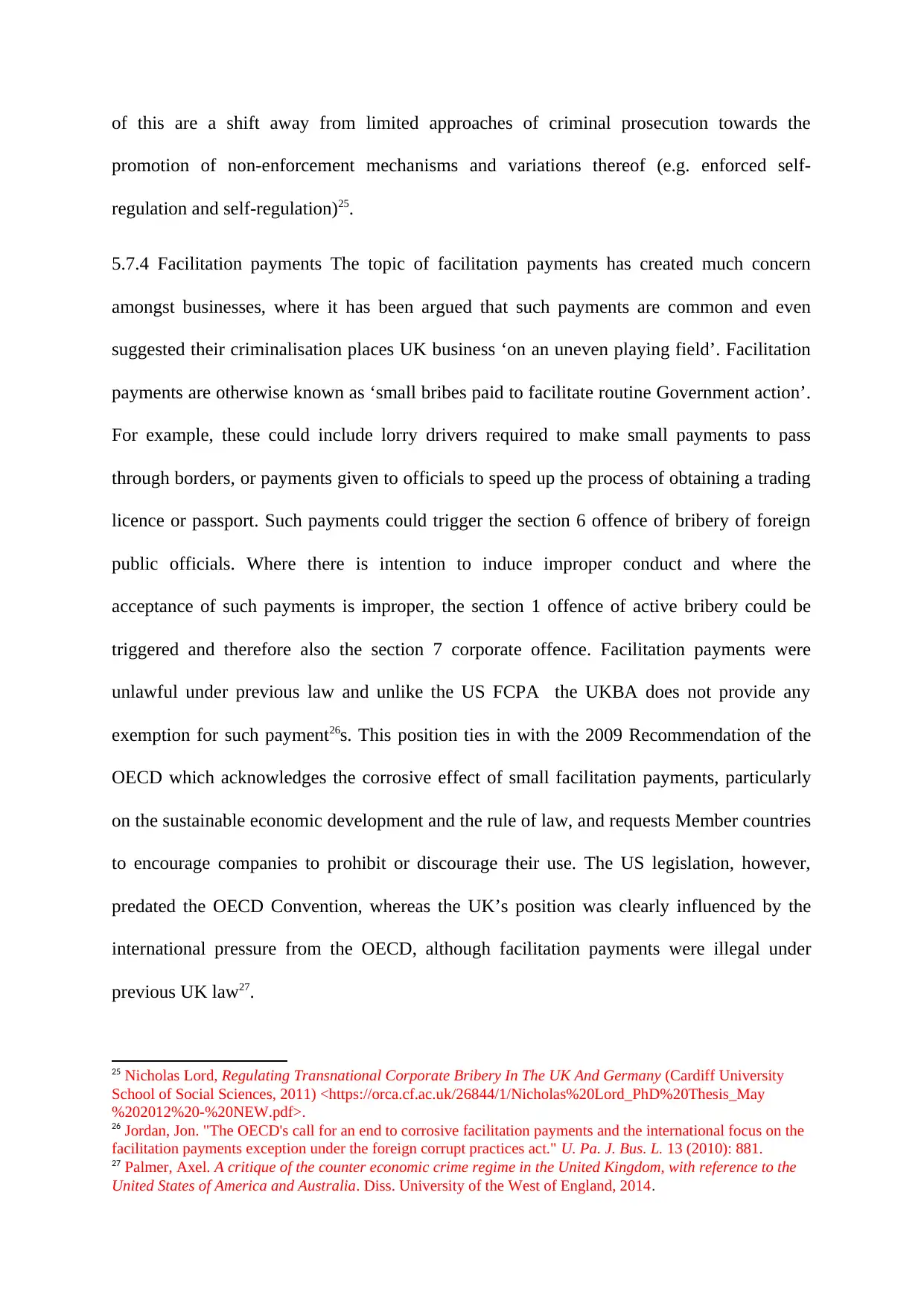
of this are a shift away from limited approaches of criminal prosecution towards the
promotion of non-enforcement mechanisms and variations thereof (e.g. enforced self-
regulation and self-regulation)25.
5.7.4 Facilitation payments The topic of facilitation payments has created much concern
amongst businesses, where it has been argued that such payments are common and even
suggested their criminalisation places UK business ‘on an uneven playing field’. Facilitation
payments are otherwise known as ‘small bribes paid to facilitate routine Government action’.
For example, these could include lorry drivers required to make small payments to pass
through borders, or payments given to officials to speed up the process of obtaining a trading
licence or passport. Such payments could trigger the section 6 offence of bribery of foreign
public officials. Where there is intention to induce improper conduct and where the
acceptance of such payments is improper, the section 1 offence of active bribery could be
triggered and therefore also the section 7 corporate offence. Facilitation payments were
unlawful under previous law and unlike the US FCPA the UKBA does not provide any
exemption for such payment26s. This position ties in with the 2009 Recommendation of the
OECD which acknowledges the corrosive effect of small facilitation payments, particularly
on the sustainable economic development and the rule of law, and requests Member countries
to encourage companies to prohibit or discourage their use. The US legislation, however,
predated the OECD Convention, whereas the UK’s position was clearly influenced by the
international pressure from the OECD, although facilitation payments were illegal under
previous UK law27.
25 Nicholas Lord, Regulating Transnational Corporate Bribery In The UK And Germany (Cardiff University
School of Social Sciences, 2011) <https://orca.cf.ac.uk/26844/1/Nicholas%20Lord_PhD%20Thesis_May
%202012%20-%20NEW.pdf>.
26 Jordan, Jon. "The OECD's call for an end to corrosive facilitation payments and the international focus on the
facilitation payments exception under the foreign corrupt practices act." U. Pa. J. Bus. L. 13 (2010): 881.
27 Palmer, Axel. A critique of the counter economic crime regime in the United Kingdom, with reference to the
United States of America and Australia. Diss. University of the West of England, 2014.
promotion of non-enforcement mechanisms and variations thereof (e.g. enforced self-
regulation and self-regulation)25.
5.7.4 Facilitation payments The topic of facilitation payments has created much concern
amongst businesses, where it has been argued that such payments are common and even
suggested their criminalisation places UK business ‘on an uneven playing field’. Facilitation
payments are otherwise known as ‘small bribes paid to facilitate routine Government action’.
For example, these could include lorry drivers required to make small payments to pass
through borders, or payments given to officials to speed up the process of obtaining a trading
licence or passport. Such payments could trigger the section 6 offence of bribery of foreign
public officials. Where there is intention to induce improper conduct and where the
acceptance of such payments is improper, the section 1 offence of active bribery could be
triggered and therefore also the section 7 corporate offence. Facilitation payments were
unlawful under previous law and unlike the US FCPA the UKBA does not provide any
exemption for such payment26s. This position ties in with the 2009 Recommendation of the
OECD which acknowledges the corrosive effect of small facilitation payments, particularly
on the sustainable economic development and the rule of law, and requests Member countries
to encourage companies to prohibit or discourage their use. The US legislation, however,
predated the OECD Convention, whereas the UK’s position was clearly influenced by the
international pressure from the OECD, although facilitation payments were illegal under
previous UK law27.
25 Nicholas Lord, Regulating Transnational Corporate Bribery In The UK And Germany (Cardiff University
School of Social Sciences, 2011) <https://orca.cf.ac.uk/26844/1/Nicholas%20Lord_PhD%20Thesis_May
%202012%20-%20NEW.pdf>.
26 Jordan, Jon. "The OECD's call for an end to corrosive facilitation payments and the international focus on the
facilitation payments exception under the foreign corrupt practices act." U. Pa. J. Bus. L. 13 (2010): 881.
27 Palmer, Axel. A critique of the counter economic crime regime in the United Kingdom, with reference to the
United States of America and Australia. Diss. University of the West of England, 2014.
Secure Best Marks with AI Grader
Need help grading? Try our AI Grader for instant feedback on your assignments.
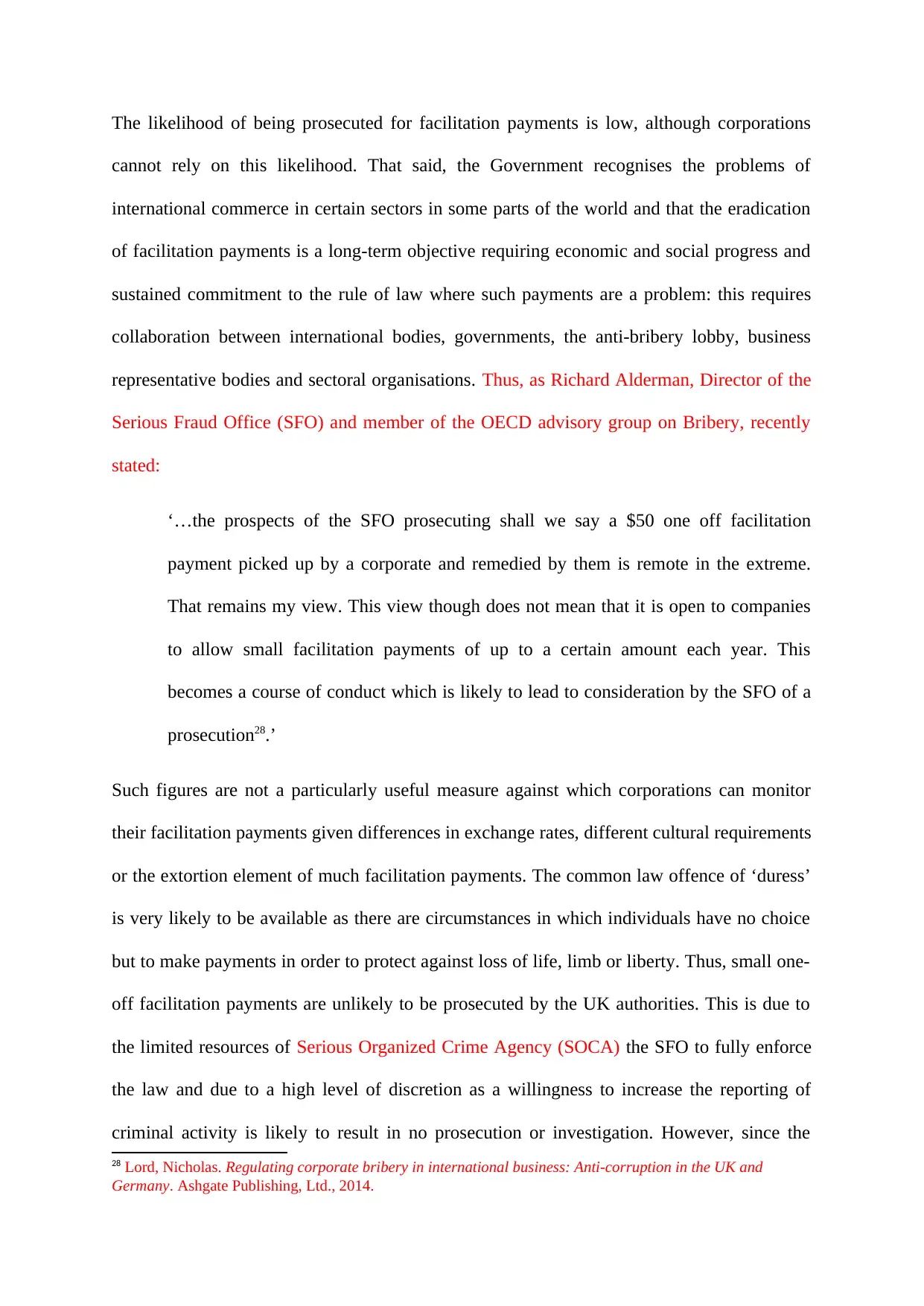
The likelihood of being prosecuted for facilitation payments is low, although corporations
cannot rely on this likelihood. That said, the Government recognises the problems of
international commerce in certain sectors in some parts of the world and that the eradication
of facilitation payments is a long-term objective requiring economic and social progress and
sustained commitment to the rule of law where such payments are a problem: this requires
collaboration between international bodies, governments, the anti-bribery lobby, business
representative bodies and sectoral organisations. Thus, as Richard Alderman, Director of the
Serious Fraud Office (SFO) and member of the OECD advisory group on Bribery, recently
stated:
‘…the prospects of the SFO prosecuting shall we say a $50 one off facilitation
payment picked up by a corporate and remedied by them is remote in the extreme.
That remains my view. This view though does not mean that it is open to companies
to allow small facilitation payments of up to a certain amount each year. This
becomes a course of conduct which is likely to lead to consideration by the SFO of a
prosecution28.’
Such figures are not a particularly useful measure against which corporations can monitor
their facilitation payments given differences in exchange rates, different cultural requirements
or the extortion element of much facilitation payments. The common law offence of ‘duress’
is very likely to be available as there are circumstances in which individuals have no choice
but to make payments in order to protect against loss of life, limb or liberty. Thus, small one-
off facilitation payments are unlikely to be prosecuted by the UK authorities. This is due to
the limited resources of Serious Organized Crime Agency (SOCA) the SFO to fully enforce
the law and due to a high level of discretion as a willingness to increase the reporting of
criminal activity is likely to result in no prosecution or investigation. However, since the
28 Lord, Nicholas. Regulating corporate bribery in international business: Anti-corruption in the UK and
Germany. Ashgate Publishing, Ltd., 2014.
cannot rely on this likelihood. That said, the Government recognises the problems of
international commerce in certain sectors in some parts of the world and that the eradication
of facilitation payments is a long-term objective requiring economic and social progress and
sustained commitment to the rule of law where such payments are a problem: this requires
collaboration between international bodies, governments, the anti-bribery lobby, business
representative bodies and sectoral organisations. Thus, as Richard Alderman, Director of the
Serious Fraud Office (SFO) and member of the OECD advisory group on Bribery, recently
stated:
‘…the prospects of the SFO prosecuting shall we say a $50 one off facilitation
payment picked up by a corporate and remedied by them is remote in the extreme.
That remains my view. This view though does not mean that it is open to companies
to allow small facilitation payments of up to a certain amount each year. This
becomes a course of conduct which is likely to lead to consideration by the SFO of a
prosecution28.’
Such figures are not a particularly useful measure against which corporations can monitor
their facilitation payments given differences in exchange rates, different cultural requirements
or the extortion element of much facilitation payments. The common law offence of ‘duress’
is very likely to be available as there are circumstances in which individuals have no choice
but to make payments in order to protect against loss of life, limb or liberty. Thus, small one-
off facilitation payments are unlikely to be prosecuted by the UK authorities. This is due to
the limited resources of Serious Organized Crime Agency (SOCA) the SFO to fully enforce
the law and due to a high level of discretion as a willingness to increase the reporting of
criminal activity is likely to result in no prosecution or investigation. However, since the
28 Lord, Nicholas. Regulating corporate bribery in international business: Anti-corruption in the UK and
Germany. Ashgate Publishing, Ltd., 2014.
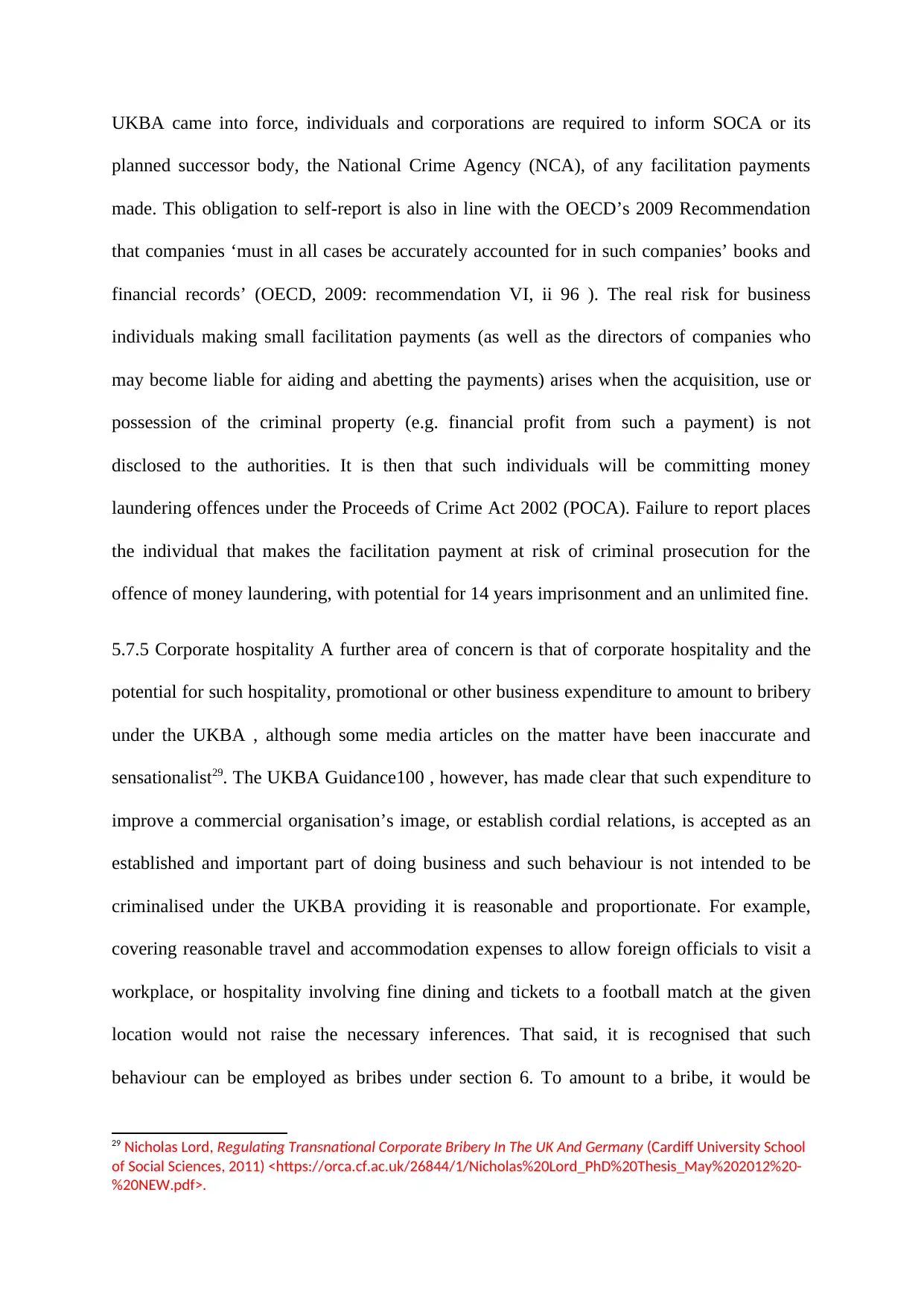
UKBA came into force, individuals and corporations are required to inform SOCA or its
planned successor body, the National Crime Agency (NCA), of any facilitation payments
made. This obligation to self-report is also in line with the OECD’s 2009 Recommendation
that companies ‘must in all cases be accurately accounted for in such companies’ books and
financial records’ (OECD, 2009: recommendation VI, ii 96 ). The real risk for business
individuals making small facilitation payments (as well as the directors of companies who
may become liable for aiding and abetting the payments) arises when the acquisition, use or
possession of the criminal property (e.g. financial profit from such a payment) is not
disclosed to the authorities. It is then that such individuals will be committing money
laundering offences under the Proceeds of Crime Act 2002 (POCA). Failure to report places
the individual that makes the facilitation payment at risk of criminal prosecution for the
offence of money laundering, with potential for 14 years imprisonment and an unlimited fine.
5.7.5 Corporate hospitality A further area of concern is that of corporate hospitality and the
potential for such hospitality, promotional or other business expenditure to amount to bribery
under the UKBA , although some media articles on the matter have been inaccurate and
sensationalist29. The UKBA Guidance100 , however, has made clear that such expenditure to
improve a commercial organisation’s image, or establish cordial relations, is accepted as an
established and important part of doing business and such behaviour is not intended to be
criminalised under the UKBA providing it is reasonable and proportionate. For example,
covering reasonable travel and accommodation expenses to allow foreign officials to visit a
workplace, or hospitality involving fine dining and tickets to a football match at the given
location would not raise the necessary inferences. That said, it is recognised that such
behaviour can be employed as bribes under section 6. To amount to a bribe, it would be
29 Nicholas Lord, Regulating Transnational Corporate Bribery In The UK And Germany (Cardiff University School
of Social Sciences, 2011) <https://orca.cf.ac.uk/26844/1/Nicholas%20Lord_PhD%20Thesis_May%202012%20-
%20NEW.pdf>.
planned successor body, the National Crime Agency (NCA), of any facilitation payments
made. This obligation to self-report is also in line with the OECD’s 2009 Recommendation
that companies ‘must in all cases be accurately accounted for in such companies’ books and
financial records’ (OECD, 2009: recommendation VI, ii 96 ). The real risk for business
individuals making small facilitation payments (as well as the directors of companies who
may become liable for aiding and abetting the payments) arises when the acquisition, use or
possession of the criminal property (e.g. financial profit from such a payment) is not
disclosed to the authorities. It is then that such individuals will be committing money
laundering offences under the Proceeds of Crime Act 2002 (POCA). Failure to report places
the individual that makes the facilitation payment at risk of criminal prosecution for the
offence of money laundering, with potential for 14 years imprisonment and an unlimited fine.
5.7.5 Corporate hospitality A further area of concern is that of corporate hospitality and the
potential for such hospitality, promotional or other business expenditure to amount to bribery
under the UKBA , although some media articles on the matter have been inaccurate and
sensationalist29. The UKBA Guidance100 , however, has made clear that such expenditure to
improve a commercial organisation’s image, or establish cordial relations, is accepted as an
established and important part of doing business and such behaviour is not intended to be
criminalised under the UKBA providing it is reasonable and proportionate. For example,
covering reasonable travel and accommodation expenses to allow foreign officials to visit a
workplace, or hospitality involving fine dining and tickets to a football match at the given
location would not raise the necessary inferences. That said, it is recognised that such
behaviour can be employed as bribes under section 6. To amount to a bribe, it would be
29 Nicholas Lord, Regulating Transnational Corporate Bribery In The UK And Germany (Cardiff University School
of Social Sciences, 2011) <https://orca.cf.ac.uk/26844/1/Nicholas%20Lord_PhD%20Thesis_May%202012%20-
%20NEW.pdf>.
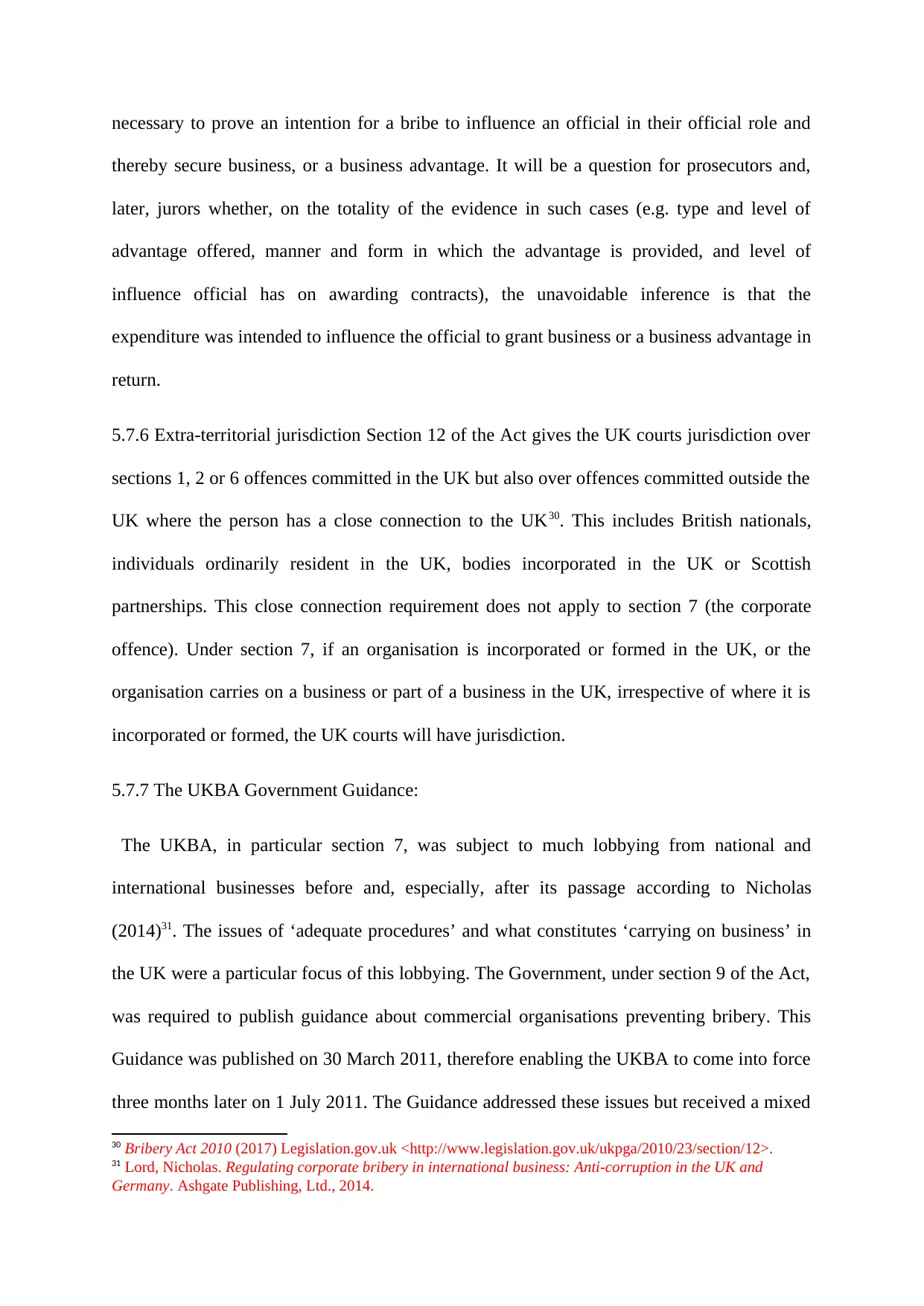
necessary to prove an intention for a bribe to influence an official in their official role and
thereby secure business, or a business advantage. It will be a question for prosecutors and,
later, jurors whether, on the totality of the evidence in such cases (e.g. type and level of
advantage offered, manner and form in which the advantage is provided, and level of
influence official has on awarding contracts), the unavoidable inference is that the
expenditure was intended to influence the official to grant business or a business advantage in
return.
5.7.6 Extra-territorial jurisdiction Section 12 of the Act gives the UK courts jurisdiction over
sections 1, 2 or 6 offences committed in the UK but also over offences committed outside the
UK where the person has a close connection to the UK30. This includes British nationals,
individuals ordinarily resident in the UK, bodies incorporated in the UK or Scottish
partnerships. This close connection requirement does not apply to section 7 (the corporate
offence). Under section 7, if an organisation is incorporated or formed in the UK, or the
organisation carries on a business or part of a business in the UK, irrespective of where it is
incorporated or formed, the UK courts will have jurisdiction.
5.7.7 The UKBA Government Guidance:
The UKBA, in particular section 7, was subject to much lobbying from national and
international businesses before and, especially, after its passage according to Nicholas
(2014)31. The issues of ‘adequate procedures’ and what constitutes ‘carrying on business’ in
the UK were a particular focus of this lobbying. The Government, under section 9 of the Act,
was required to publish guidance about commercial organisations preventing bribery. This
Guidance was published on 30 March 2011, therefore enabling the UKBA to come into force
three months later on 1 July 2011. The Guidance addressed these issues but received a mixed
30 Bribery Act 2010 (2017) Legislation.gov.uk <http://www.legislation.gov.uk/ukpga/2010/23/section/12>.
31 Lord, Nicholas. Regulating corporate bribery in international business: Anti-corruption in the UK and
Germany. Ashgate Publishing, Ltd., 2014.
thereby secure business, or a business advantage. It will be a question for prosecutors and,
later, jurors whether, on the totality of the evidence in such cases (e.g. type and level of
advantage offered, manner and form in which the advantage is provided, and level of
influence official has on awarding contracts), the unavoidable inference is that the
expenditure was intended to influence the official to grant business or a business advantage in
return.
5.7.6 Extra-territorial jurisdiction Section 12 of the Act gives the UK courts jurisdiction over
sections 1, 2 or 6 offences committed in the UK but also over offences committed outside the
UK where the person has a close connection to the UK30. This includes British nationals,
individuals ordinarily resident in the UK, bodies incorporated in the UK or Scottish
partnerships. This close connection requirement does not apply to section 7 (the corporate
offence). Under section 7, if an organisation is incorporated or formed in the UK, or the
organisation carries on a business or part of a business in the UK, irrespective of where it is
incorporated or formed, the UK courts will have jurisdiction.
5.7.7 The UKBA Government Guidance:
The UKBA, in particular section 7, was subject to much lobbying from national and
international businesses before and, especially, after its passage according to Nicholas
(2014)31. The issues of ‘adequate procedures’ and what constitutes ‘carrying on business’ in
the UK were a particular focus of this lobbying. The Government, under section 9 of the Act,
was required to publish guidance about commercial organisations preventing bribery. This
Guidance was published on 30 March 2011, therefore enabling the UKBA to come into force
three months later on 1 July 2011. The Guidance addressed these issues but received a mixed
30 Bribery Act 2010 (2017) Legislation.gov.uk <http://www.legislation.gov.uk/ukpga/2010/23/section/12>.
31 Lord, Nicholas. Regulating corporate bribery in international business: Anti-corruption in the UK and
Germany. Ashgate Publishing, Ltd., 2014.
Paraphrase This Document
Need a fresh take? Get an instant paraphrase of this document with our AI Paraphraser
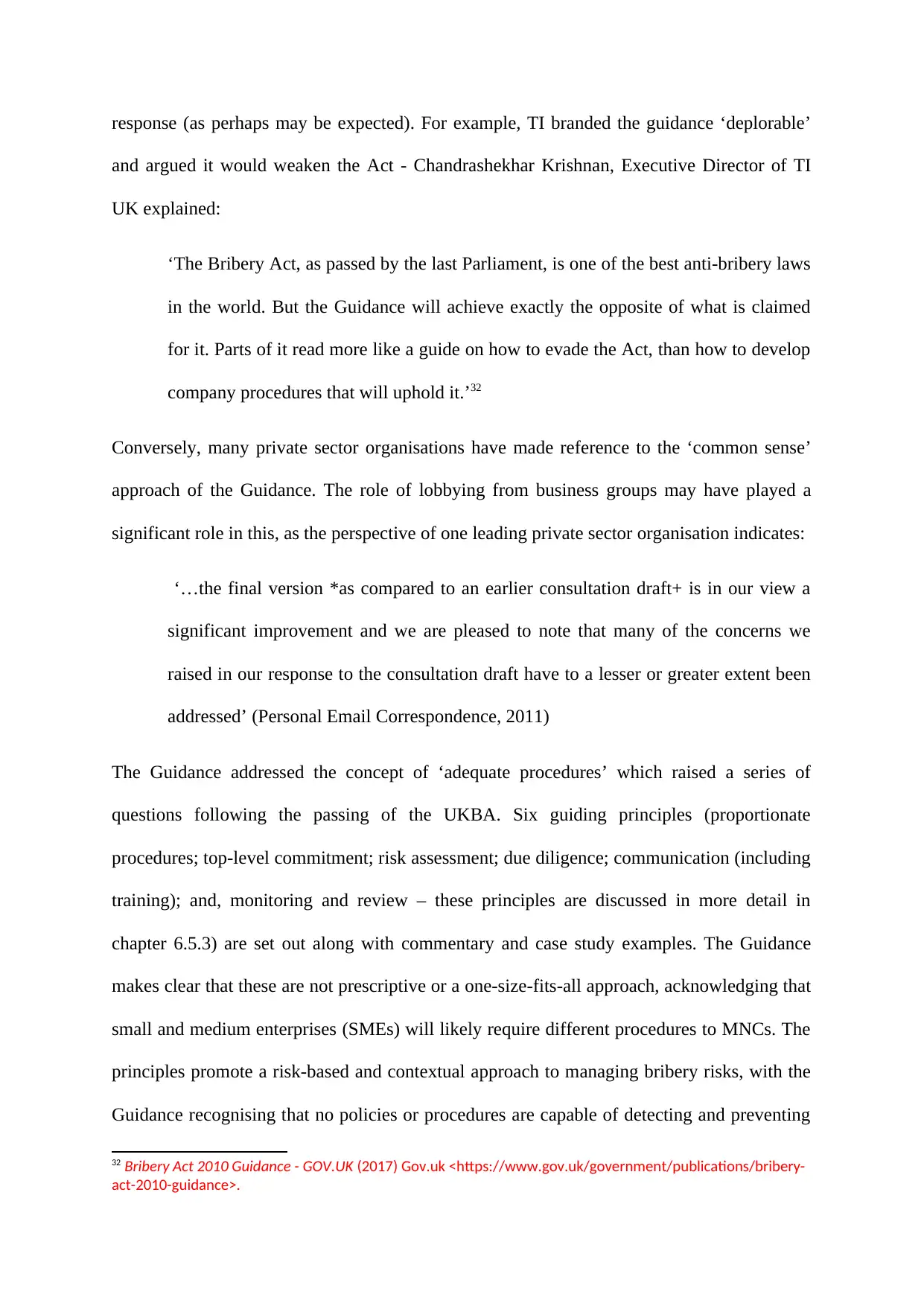
response (as perhaps may be expected). For example, TI branded the guidance ‘deplorable’
and argued it would weaken the Act - Chandrashekhar Krishnan, Executive Director of TI
UK explained:
‘The Bribery Act, as passed by the last Parliament, is one of the best anti-bribery laws
in the world. But the Guidance will achieve exactly the opposite of what is claimed
for it. Parts of it read more like a guide on how to evade the Act, than how to develop
company procedures that will uphold it.’32
Conversely, many private sector organisations have made reference to the ‘common sense’
approach of the Guidance. The role of lobbying from business groups may have played a
significant role in this, as the perspective of one leading private sector organisation indicates:
‘…the final version *as compared to an earlier consultation draft+ is in our view a
significant improvement and we are pleased to note that many of the concerns we
raised in our response to the consultation draft have to a lesser or greater extent been
addressed’ (Personal Email Correspondence, 2011)
The Guidance addressed the concept of ‘adequate procedures’ which raised a series of
questions following the passing of the UKBA. Six guiding principles (proportionate
procedures; top-level commitment; risk assessment; due diligence; communication (including
training); and, monitoring and review – these principles are discussed in more detail in
chapter 6.5.3) are set out along with commentary and case study examples. The Guidance
makes clear that these are not prescriptive or a one-size-fits-all approach, acknowledging that
small and medium enterprises (SMEs) will likely require different procedures to MNCs. The
principles promote a risk-based and contextual approach to managing bribery risks, with the
Guidance recognising that no policies or procedures are capable of detecting and preventing
32 Bribery Act 2010 Guidance - GOV.UK (2017) Gov.uk <https://www.gov.uk/government/publications/bribery-
act-2010-guidance>.
and argued it would weaken the Act - Chandrashekhar Krishnan, Executive Director of TI
UK explained:
‘The Bribery Act, as passed by the last Parliament, is one of the best anti-bribery laws
in the world. But the Guidance will achieve exactly the opposite of what is claimed
for it. Parts of it read more like a guide on how to evade the Act, than how to develop
company procedures that will uphold it.’32
Conversely, many private sector organisations have made reference to the ‘common sense’
approach of the Guidance. The role of lobbying from business groups may have played a
significant role in this, as the perspective of one leading private sector organisation indicates:
‘…the final version *as compared to an earlier consultation draft+ is in our view a
significant improvement and we are pleased to note that many of the concerns we
raised in our response to the consultation draft have to a lesser or greater extent been
addressed’ (Personal Email Correspondence, 2011)
The Guidance addressed the concept of ‘adequate procedures’ which raised a series of
questions following the passing of the UKBA. Six guiding principles (proportionate
procedures; top-level commitment; risk assessment; due diligence; communication (including
training); and, monitoring and review – these principles are discussed in more detail in
chapter 6.5.3) are set out along with commentary and case study examples. The Guidance
makes clear that these are not prescriptive or a one-size-fits-all approach, acknowledging that
small and medium enterprises (SMEs) will likely require different procedures to MNCs. The
principles promote a risk-based and contextual approach to managing bribery risks, with the
Guidance recognising that no policies or procedures are capable of detecting and preventing
32 Bribery Act 2010 Guidance - GOV.UK (2017) Gov.uk <https://www.gov.uk/government/publications/bribery-
act-2010-guidance>.
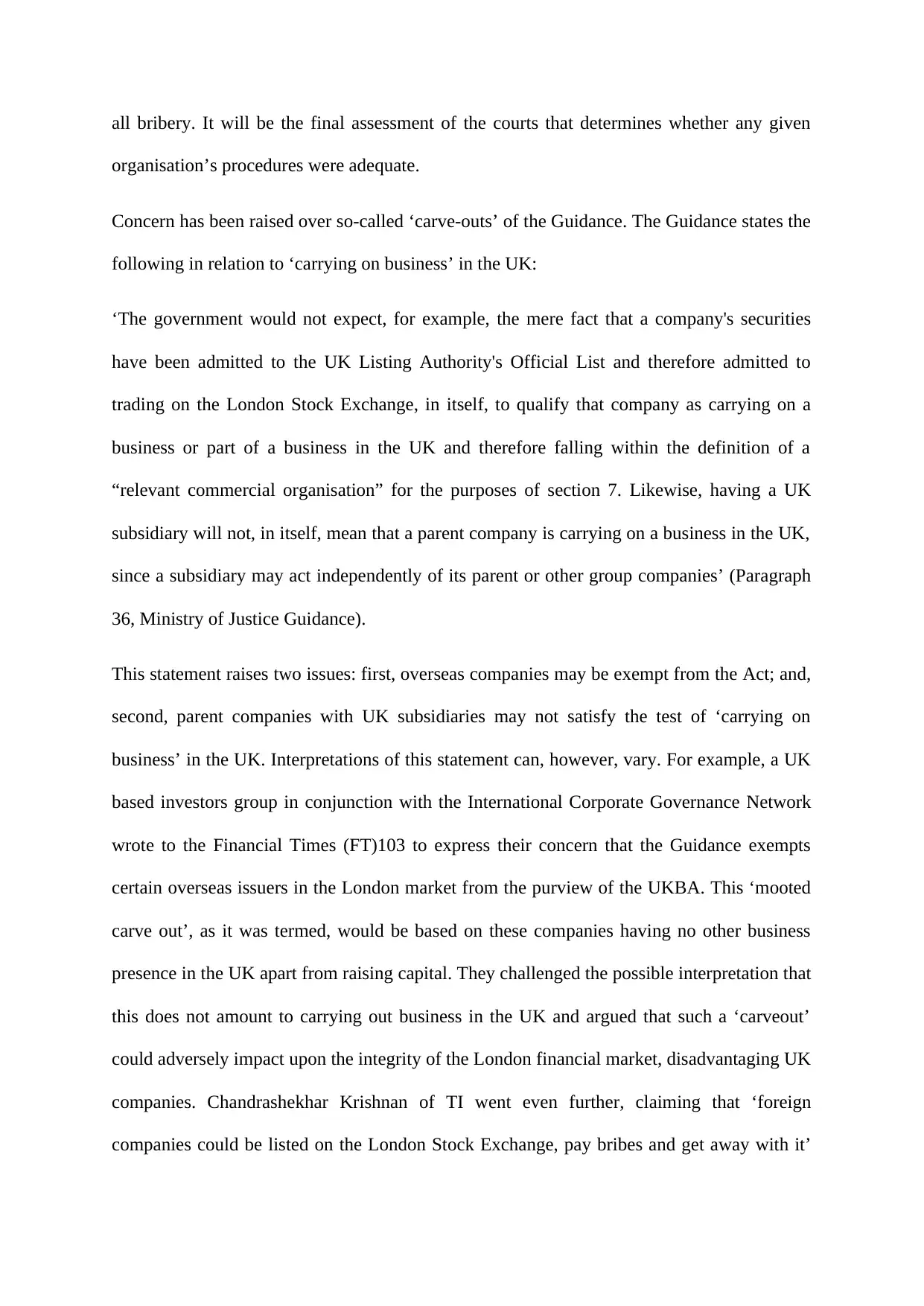
all bribery. It will be the final assessment of the courts that determines whether any given
organisation’s procedures were adequate.
Concern has been raised over so-called ‘carve-outs’ of the Guidance. The Guidance states the
following in relation to ‘carrying on business’ in the UK:
‘The government would not expect, for example, the mere fact that a company's securities
have been admitted to the UK Listing Authority's Official List and therefore admitted to
trading on the London Stock Exchange, in itself, to qualify that company as carrying on a
business or part of a business in the UK and therefore falling within the definition of a
“relevant commercial organisation” for the purposes of section 7. Likewise, having a UK
subsidiary will not, in itself, mean that a parent company is carrying on a business in the UK,
since a subsidiary may act independently of its parent or other group companies’ (Paragraph
36, Ministry of Justice Guidance).
This statement raises two issues: first, overseas companies may be exempt from the Act; and,
second, parent companies with UK subsidiaries may not satisfy the test of ‘carrying on
business’ in the UK. Interpretations of this statement can, however, vary. For example, a UK
based investors group in conjunction with the International Corporate Governance Network
wrote to the Financial Times (FT)103 to express their concern that the Guidance exempts
certain overseas issuers in the London market from the purview of the UKBA. This ‘mooted
carve out’, as it was termed, would be based on these companies having no other business
presence in the UK apart from raising capital. They challenged the possible interpretation that
this does not amount to carrying out business in the UK and argued that such a ‘carveout’
could adversely impact upon the integrity of the London financial market, disadvantaging UK
companies. Chandrashekhar Krishnan of TI went even further, claiming that ‘foreign
companies could be listed on the London Stock Exchange, pay bribes and get away with it’
organisation’s procedures were adequate.
Concern has been raised over so-called ‘carve-outs’ of the Guidance. The Guidance states the
following in relation to ‘carrying on business’ in the UK:
‘The government would not expect, for example, the mere fact that a company's securities
have been admitted to the UK Listing Authority's Official List and therefore admitted to
trading on the London Stock Exchange, in itself, to qualify that company as carrying on a
business or part of a business in the UK and therefore falling within the definition of a
“relevant commercial organisation” for the purposes of section 7. Likewise, having a UK
subsidiary will not, in itself, mean that a parent company is carrying on a business in the UK,
since a subsidiary may act independently of its parent or other group companies’ (Paragraph
36, Ministry of Justice Guidance).
This statement raises two issues: first, overseas companies may be exempt from the Act; and,
second, parent companies with UK subsidiaries may not satisfy the test of ‘carrying on
business’ in the UK. Interpretations of this statement can, however, vary. For example, a UK
based investors group in conjunction with the International Corporate Governance Network
wrote to the Financial Times (FT)103 to express their concern that the Guidance exempts
certain overseas issuers in the London market from the purview of the UKBA. This ‘mooted
carve out’, as it was termed, would be based on these companies having no other business
presence in the UK apart from raising capital. They challenged the possible interpretation that
this does not amount to carrying out business in the UK and argued that such a ‘carveout’
could adversely impact upon the integrity of the London financial market, disadvantaging UK
companies. Chandrashekhar Krishnan of TI went even further, claiming that ‘foreign
companies could be listed on the London Stock Exchange, pay bribes and get away with it’
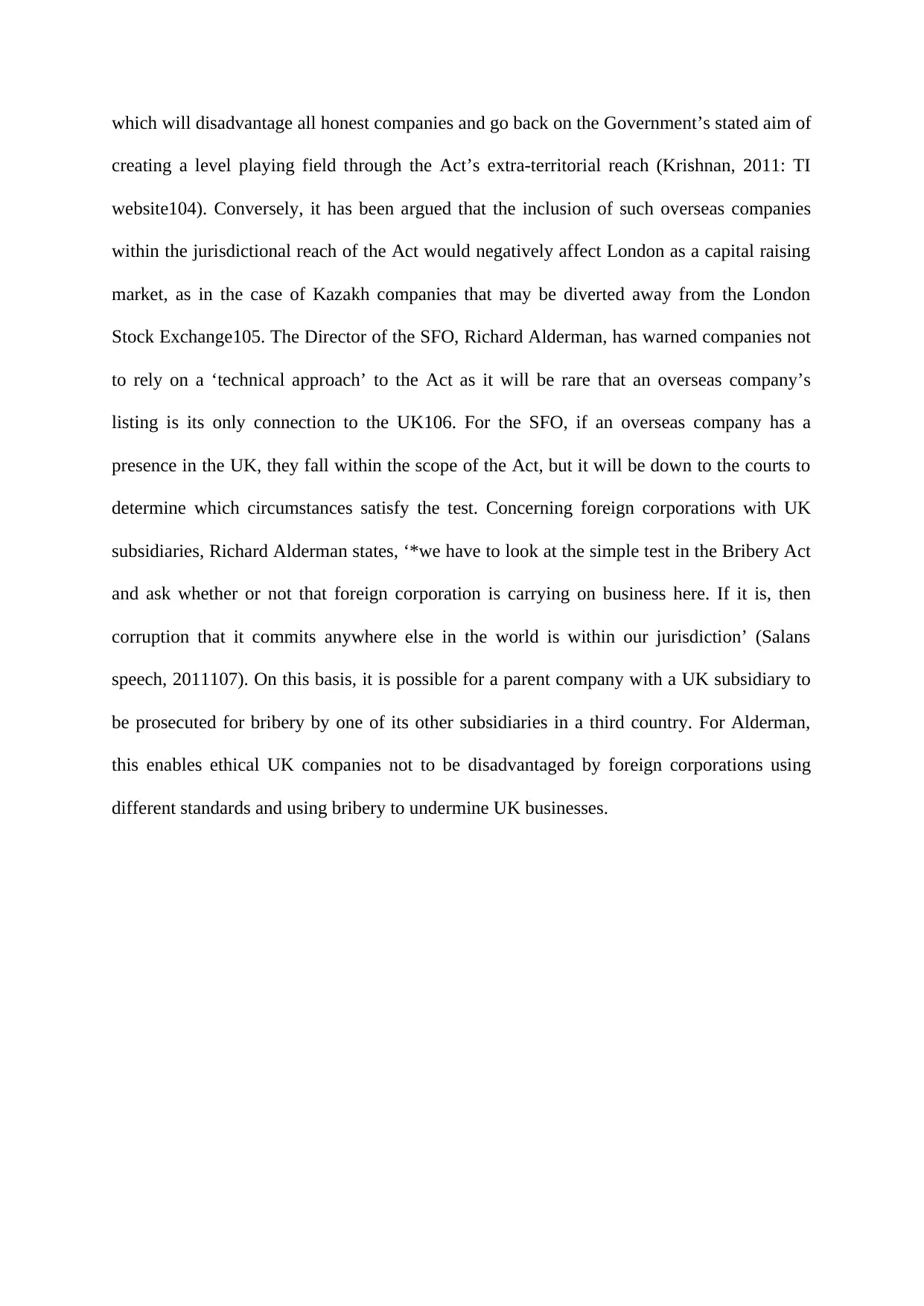
which will disadvantage all honest companies and go back on the Government’s stated aim of
creating a level playing field through the Act’s extra-territorial reach (Krishnan, 2011: TI
website104). Conversely, it has been argued that the inclusion of such overseas companies
within the jurisdictional reach of the Act would negatively affect London as a capital raising
market, as in the case of Kazakh companies that may be diverted away from the London
Stock Exchange105. The Director of the SFO, Richard Alderman, has warned companies not
to rely on a ‘technical approach’ to the Act as it will be rare that an overseas company’s
listing is its only connection to the UK106. For the SFO, if an overseas company has a
presence in the UK, they fall within the scope of the Act, but it will be down to the courts to
determine which circumstances satisfy the test. Concerning foreign corporations with UK
subsidiaries, Richard Alderman states, ‘*we have to look at the simple test in the Bribery Act
and ask whether or not that foreign corporation is carrying on business here. If it is, then
corruption that it commits anywhere else in the world is within our jurisdiction’ (Salans
speech, 2011107). On this basis, it is possible for a parent company with a UK subsidiary to
be prosecuted for bribery by one of its other subsidiaries in a third country. For Alderman,
this enables ethical UK companies not to be disadvantaged by foreign corporations using
different standards and using bribery to undermine UK businesses.
creating a level playing field through the Act’s extra-territorial reach (Krishnan, 2011: TI
website104). Conversely, it has been argued that the inclusion of such overseas companies
within the jurisdictional reach of the Act would negatively affect London as a capital raising
market, as in the case of Kazakh companies that may be diverted away from the London
Stock Exchange105. The Director of the SFO, Richard Alderman, has warned companies not
to rely on a ‘technical approach’ to the Act as it will be rare that an overseas company’s
listing is its only connection to the UK106. For the SFO, if an overseas company has a
presence in the UK, they fall within the scope of the Act, but it will be down to the courts to
determine which circumstances satisfy the test. Concerning foreign corporations with UK
subsidiaries, Richard Alderman states, ‘*we have to look at the simple test in the Bribery Act
and ask whether or not that foreign corporation is carrying on business here. If it is, then
corruption that it commits anywhere else in the world is within our jurisdiction’ (Salans
speech, 2011107). On this basis, it is possible for a parent company with a UK subsidiary to
be prosecuted for bribery by one of its other subsidiaries in a third country. For Alderman,
this enables ethical UK companies not to be disadvantaged by foreign corporations using
different standards and using bribery to undermine UK businesses.
Secure Best Marks with AI Grader
Need help grading? Try our AI Grader for instant feedback on your assignments.
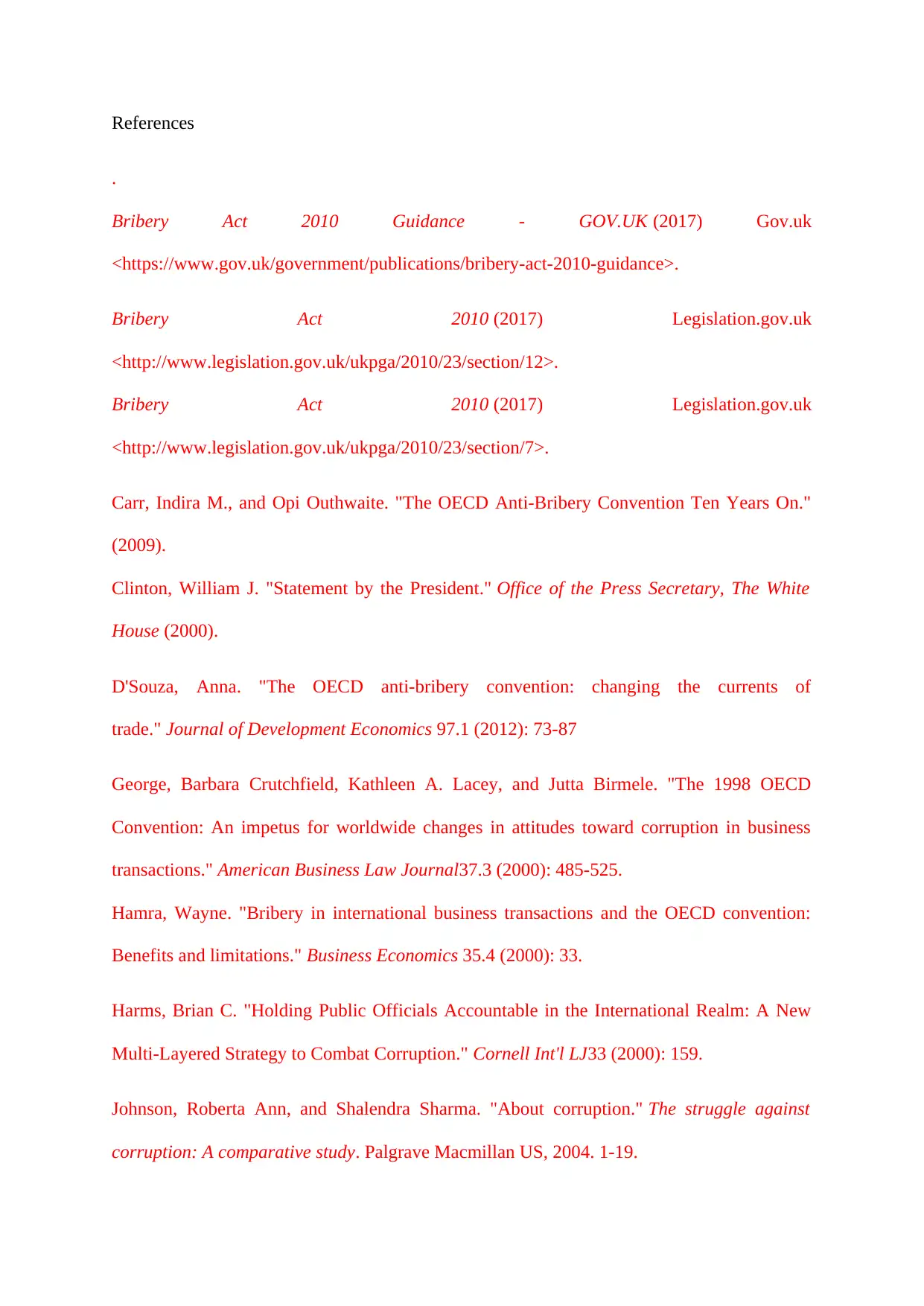
References
.
Bribery Act 2010 Guidance - GOV.UK (2017) Gov.uk
<https://www.gov.uk/government/publications/bribery-act-2010-guidance>.
Bribery Act 2010 (2017) Legislation.gov.uk
<http://www.legislation.gov.uk/ukpga/2010/23/section/12>.
Bribery Act 2010 (2017) Legislation.gov.uk
<http://www.legislation.gov.uk/ukpga/2010/23/section/7>.
Carr, Indira M., and Opi Outhwaite. "The OECD Anti-Bribery Convention Ten Years On."
(2009).
Clinton, William J. "Statement by the President." Office of the Press Secretary, The White
House (2000).
D'Souza, Anna. "The OECD anti-bribery convention: changing the currents of
trade." Journal of Development Economics 97.1 (2012): 73-87
George, Barbara Crutchfield, Kathleen A. Lacey, and Jutta Birmele. "The 1998 OECD
Convention: An impetus for worldwide changes in attitudes toward corruption in business
transactions." American Business Law Journal37.3 (2000): 485-525.
Hamra, Wayne. "Bribery in international business transactions and the OECD convention:
Benefits and limitations." Business Economics 35.4 (2000): 33.
Harms, Brian C. "Holding Public Officials Accountable in the International Realm: A New
Multi-Layered Strategy to Combat Corruption." Cornell Int'l LJ33 (2000): 159.
Johnson, Roberta Ann, and Shalendra Sharma. "About corruption." The struggle against
corruption: A comparative study. Palgrave Macmillan US, 2004. 1-19.
.
Bribery Act 2010 Guidance - GOV.UK (2017) Gov.uk
<https://www.gov.uk/government/publications/bribery-act-2010-guidance>.
Bribery Act 2010 (2017) Legislation.gov.uk
<http://www.legislation.gov.uk/ukpga/2010/23/section/12>.
Bribery Act 2010 (2017) Legislation.gov.uk
<http://www.legislation.gov.uk/ukpga/2010/23/section/7>.
Carr, Indira M., and Opi Outhwaite. "The OECD Anti-Bribery Convention Ten Years On."
(2009).
Clinton, William J. "Statement by the President." Office of the Press Secretary, The White
House (2000).
D'Souza, Anna. "The OECD anti-bribery convention: changing the currents of
trade." Journal of Development Economics 97.1 (2012): 73-87
George, Barbara Crutchfield, Kathleen A. Lacey, and Jutta Birmele. "The 1998 OECD
Convention: An impetus for worldwide changes in attitudes toward corruption in business
transactions." American Business Law Journal37.3 (2000): 485-525.
Hamra, Wayne. "Bribery in international business transactions and the OECD convention:
Benefits and limitations." Business Economics 35.4 (2000): 33.
Harms, Brian C. "Holding Public Officials Accountable in the International Realm: A New
Multi-Layered Strategy to Combat Corruption." Cornell Int'l LJ33 (2000): 159.
Johnson, Roberta Ann, and Shalendra Sharma. "About corruption." The struggle against
corruption: A comparative study. Palgrave Macmillan US, 2004. 1-19.
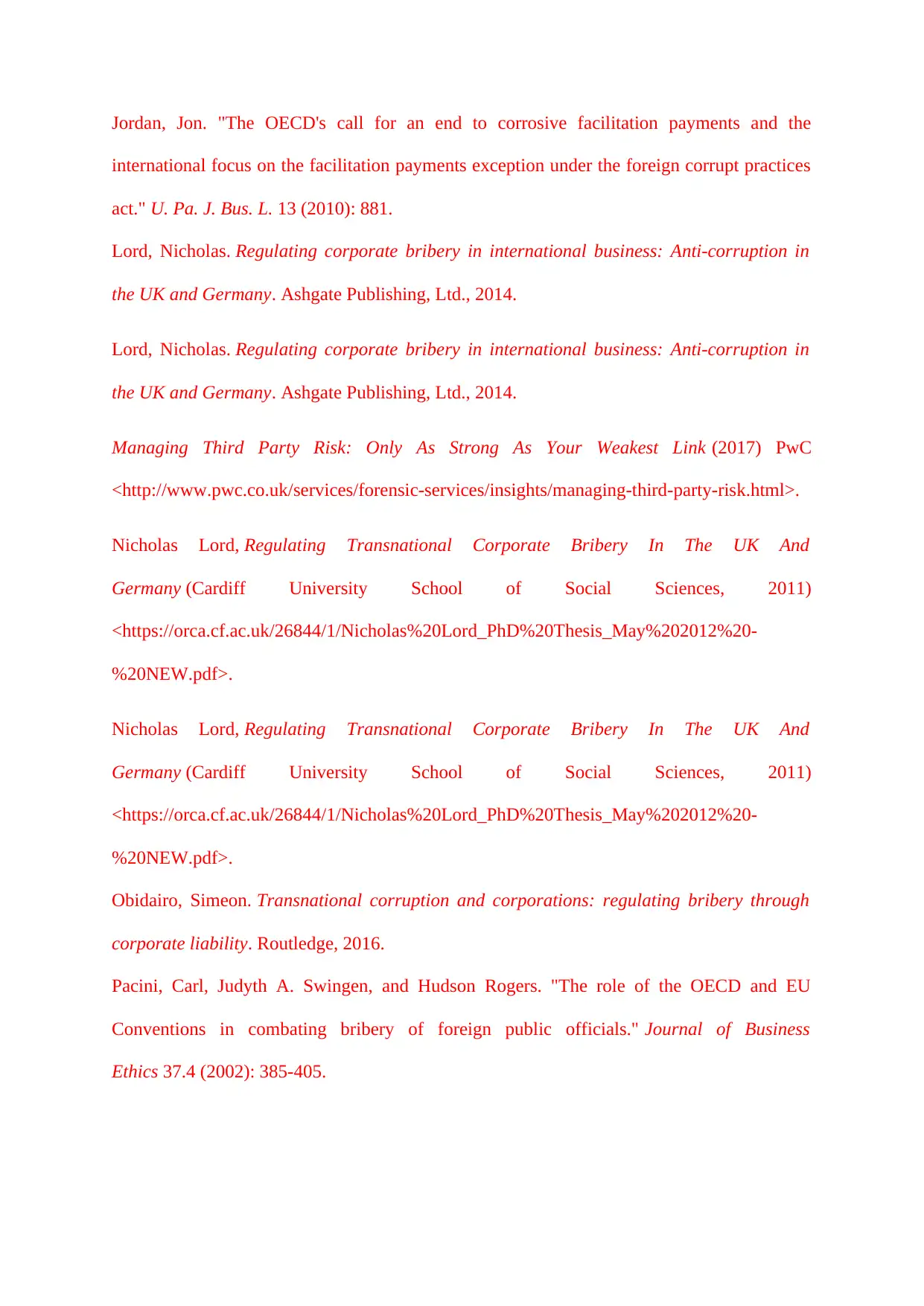
Jordan, Jon. "The OECD's call for an end to corrosive facilitation payments and the
international focus on the facilitation payments exception under the foreign corrupt practices
act." U. Pa. J. Bus. L. 13 (2010): 881.
Lord, Nicholas. Regulating corporate bribery in international business: Anti-corruption in
the UK and Germany. Ashgate Publishing, Ltd., 2014.
Lord, Nicholas. Regulating corporate bribery in international business: Anti-corruption in
the UK and Germany. Ashgate Publishing, Ltd., 2014.
Managing Third Party Risk: Only As Strong As Your Weakest Link (2017) PwC
<http://www.pwc.co.uk/services/forensic-services/insights/managing-third-party-risk.html>.
Nicholas Lord, Regulating Transnational Corporate Bribery In The UK And
Germany (Cardiff University School of Social Sciences, 2011)
<https://orca.cf.ac.uk/26844/1/Nicholas%20Lord_PhD%20Thesis_May%202012%20-
%20NEW.pdf>.
Nicholas Lord, Regulating Transnational Corporate Bribery In The UK And
Germany (Cardiff University School of Social Sciences, 2011)
<https://orca.cf.ac.uk/26844/1/Nicholas%20Lord_PhD%20Thesis_May%202012%20-
%20NEW.pdf>.
Obidairo, Simeon. Transnational corruption and corporations: regulating bribery through
corporate liability. Routledge, 2016.
Pacini, Carl, Judyth A. Swingen, and Hudson Rogers. "The role of the OECD and EU
Conventions in combating bribery of foreign public officials." Journal of Business
Ethics 37.4 (2002): 385-405.
international focus on the facilitation payments exception under the foreign corrupt practices
act." U. Pa. J. Bus. L. 13 (2010): 881.
Lord, Nicholas. Regulating corporate bribery in international business: Anti-corruption in
the UK and Germany. Ashgate Publishing, Ltd., 2014.
Lord, Nicholas. Regulating corporate bribery in international business: Anti-corruption in
the UK and Germany. Ashgate Publishing, Ltd., 2014.
Managing Third Party Risk: Only As Strong As Your Weakest Link (2017) PwC
<http://www.pwc.co.uk/services/forensic-services/insights/managing-third-party-risk.html>.
Nicholas Lord, Regulating Transnational Corporate Bribery In The UK And
Germany (Cardiff University School of Social Sciences, 2011)
<https://orca.cf.ac.uk/26844/1/Nicholas%20Lord_PhD%20Thesis_May%202012%20-
%20NEW.pdf>.
Nicholas Lord, Regulating Transnational Corporate Bribery In The UK And
Germany (Cardiff University School of Social Sciences, 2011)
<https://orca.cf.ac.uk/26844/1/Nicholas%20Lord_PhD%20Thesis_May%202012%20-
%20NEW.pdf>.
Obidairo, Simeon. Transnational corruption and corporations: regulating bribery through
corporate liability. Routledge, 2016.
Pacini, Carl, Judyth A. Swingen, and Hudson Rogers. "The role of the OECD and EU
Conventions in combating bribery of foreign public officials." Journal of Business
Ethics 37.4 (2002): 385-405.
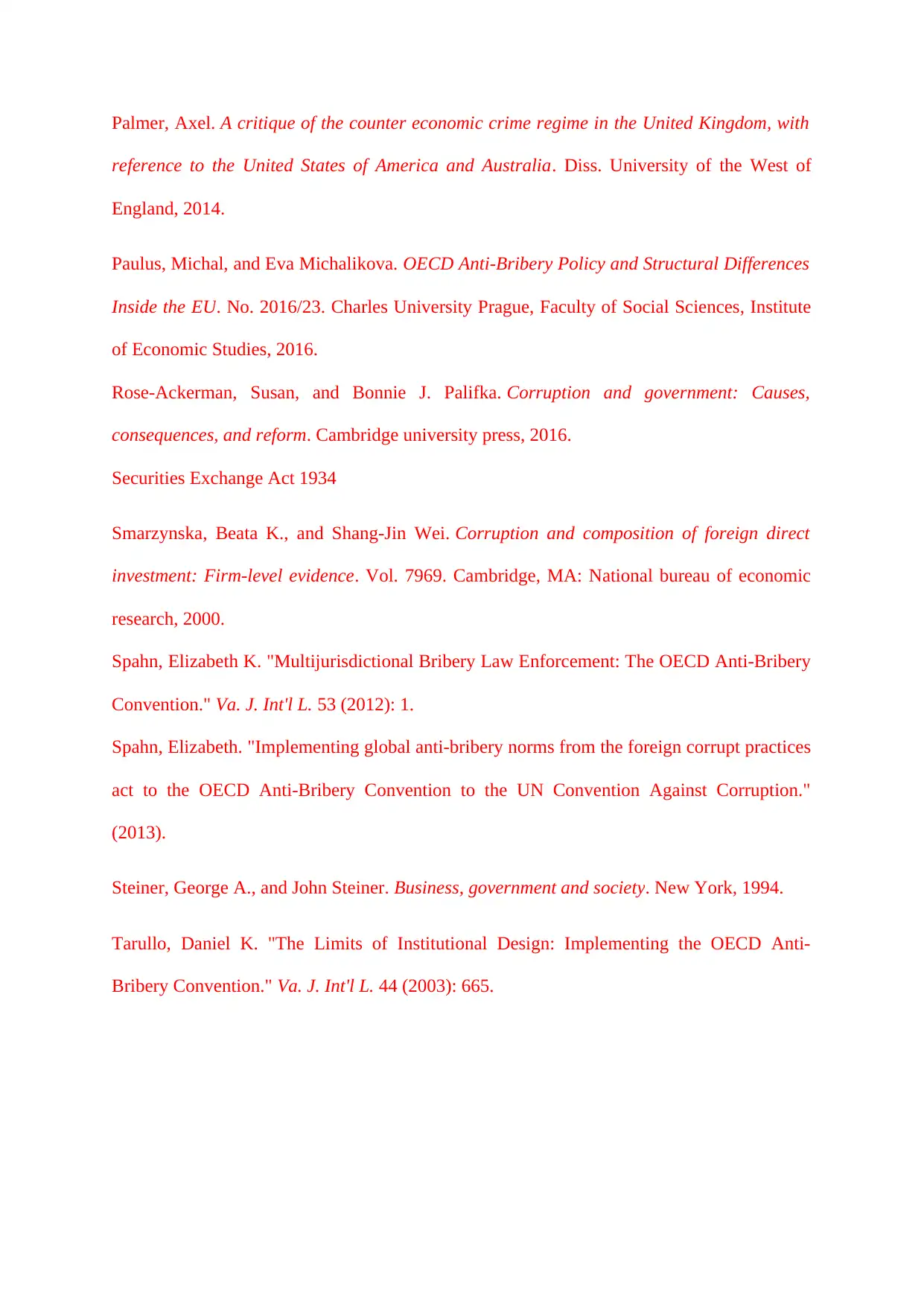
Palmer, Axel. A critique of the counter economic crime regime in the United Kingdom, with
reference to the United States of America and Australia. Diss. University of the West of
England, 2014.
Paulus, Michal, and Eva Michalikova. OECD Anti-Bribery Policy and Structural Differences
Inside the EU. No. 2016/23. Charles University Prague, Faculty of Social Sciences, Institute
of Economic Studies, 2016.
Rose-Ackerman, Susan, and Bonnie J. Palifka. Corruption and government: Causes,
consequences, and reform. Cambridge university press, 2016.
Securities Exchange Act 1934
Smarzynska, Beata K., and Shang-Jin Wei. Corruption and composition of foreign direct
investment: Firm-level evidence. Vol. 7969. Cambridge, MA: National bureau of economic
research, 2000.
Spahn, Elizabeth K. "Multijurisdictional Bribery Law Enforcement: The OECD Anti-Bribery
Convention." Va. J. Int'l L. 53 (2012): 1.
Spahn, Elizabeth. "Implementing global anti-bribery norms from the foreign corrupt practices
act to the OECD Anti-Bribery Convention to the UN Convention Against Corruption."
(2013).
Steiner, George A., and John Steiner. Business, government and society. New York, 1994.
Tarullo, Daniel K. "The Limits of Institutional Design: Implementing the OECD Anti-
Bribery Convention." Va. J. Int'l L. 44 (2003): 665.
reference to the United States of America and Australia. Diss. University of the West of
England, 2014.
Paulus, Michal, and Eva Michalikova. OECD Anti-Bribery Policy and Structural Differences
Inside the EU. No. 2016/23. Charles University Prague, Faculty of Social Sciences, Institute
of Economic Studies, 2016.
Rose-Ackerman, Susan, and Bonnie J. Palifka. Corruption and government: Causes,
consequences, and reform. Cambridge university press, 2016.
Securities Exchange Act 1934
Smarzynska, Beata K., and Shang-Jin Wei. Corruption and composition of foreign direct
investment: Firm-level evidence. Vol. 7969. Cambridge, MA: National bureau of economic
research, 2000.
Spahn, Elizabeth K. "Multijurisdictional Bribery Law Enforcement: The OECD Anti-Bribery
Convention." Va. J. Int'l L. 53 (2012): 1.
Spahn, Elizabeth. "Implementing global anti-bribery norms from the foreign corrupt practices
act to the OECD Anti-Bribery Convention to the UN Convention Against Corruption."
(2013).
Steiner, George A., and John Steiner. Business, government and society. New York, 1994.
Tarullo, Daniel K. "The Limits of Institutional Design: Implementing the OECD Anti-
Bribery Convention." Va. J. Int'l L. 44 (2003): 665.
1 out of 25
Related Documents
Your All-in-One AI-Powered Toolkit for Academic Success.
+13062052269
info@desklib.com
Available 24*7 on WhatsApp / Email
![[object Object]](/_next/static/media/star-bottom.7253800d.svg)
Unlock your academic potential
© 2024 | Zucol Services PVT LTD | All rights reserved.





